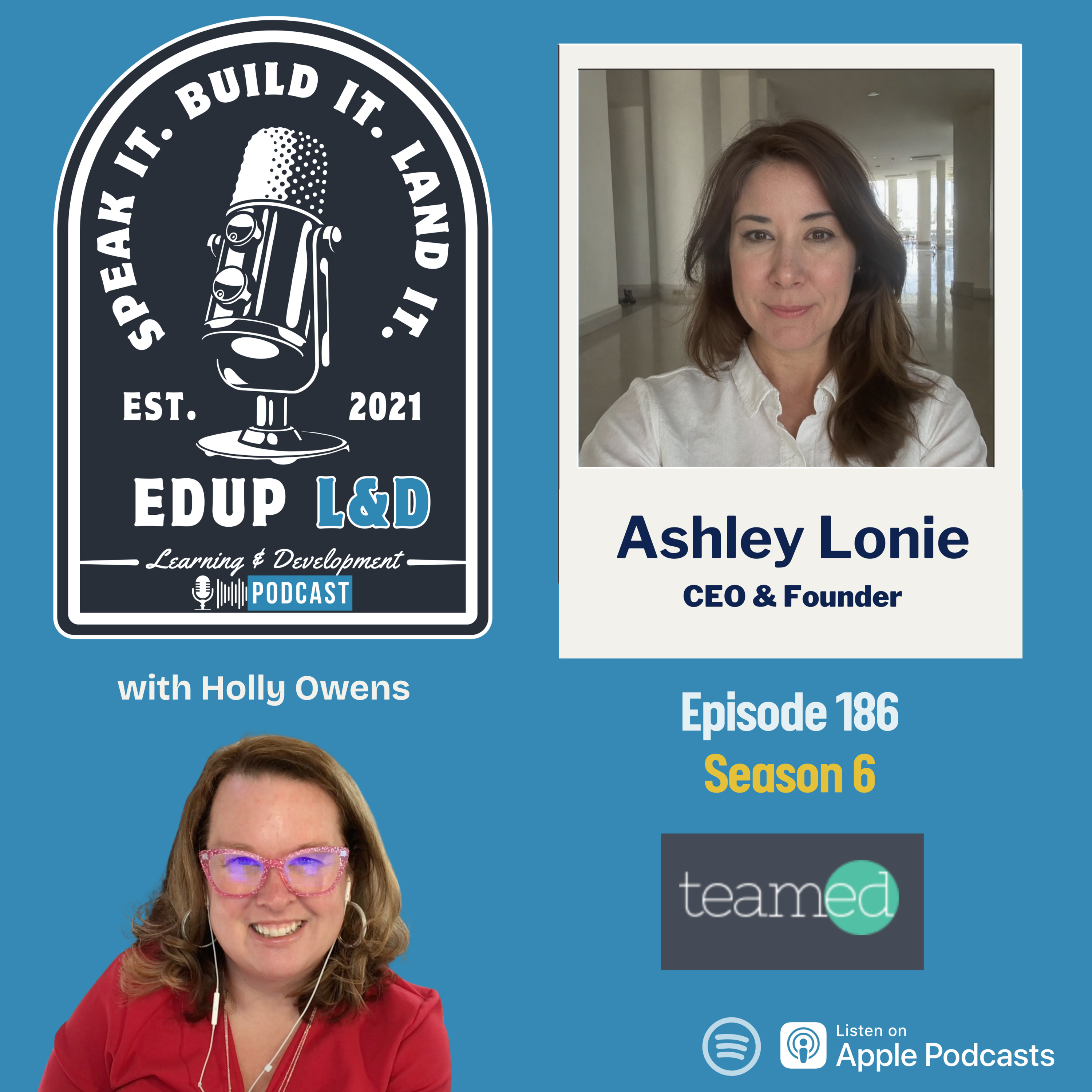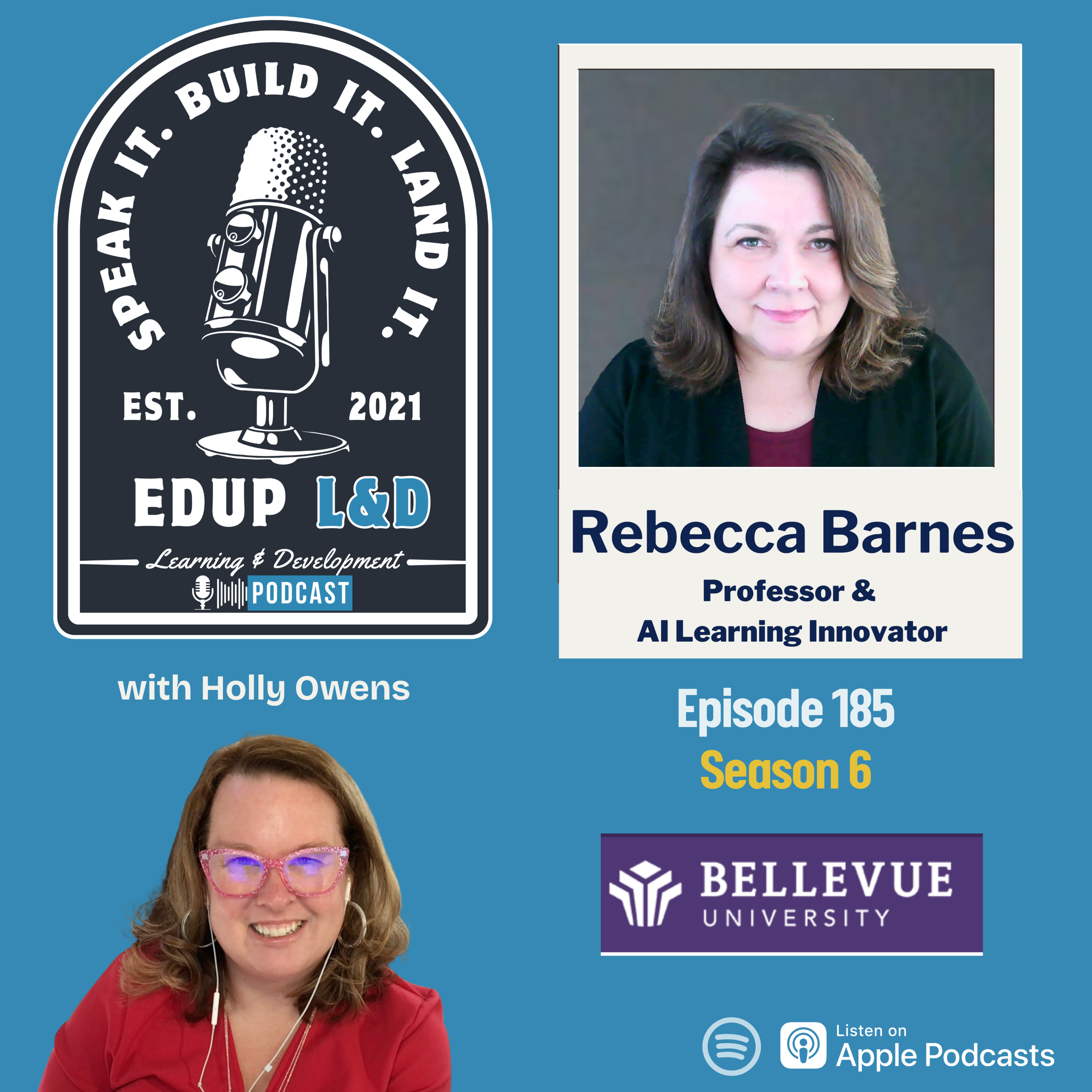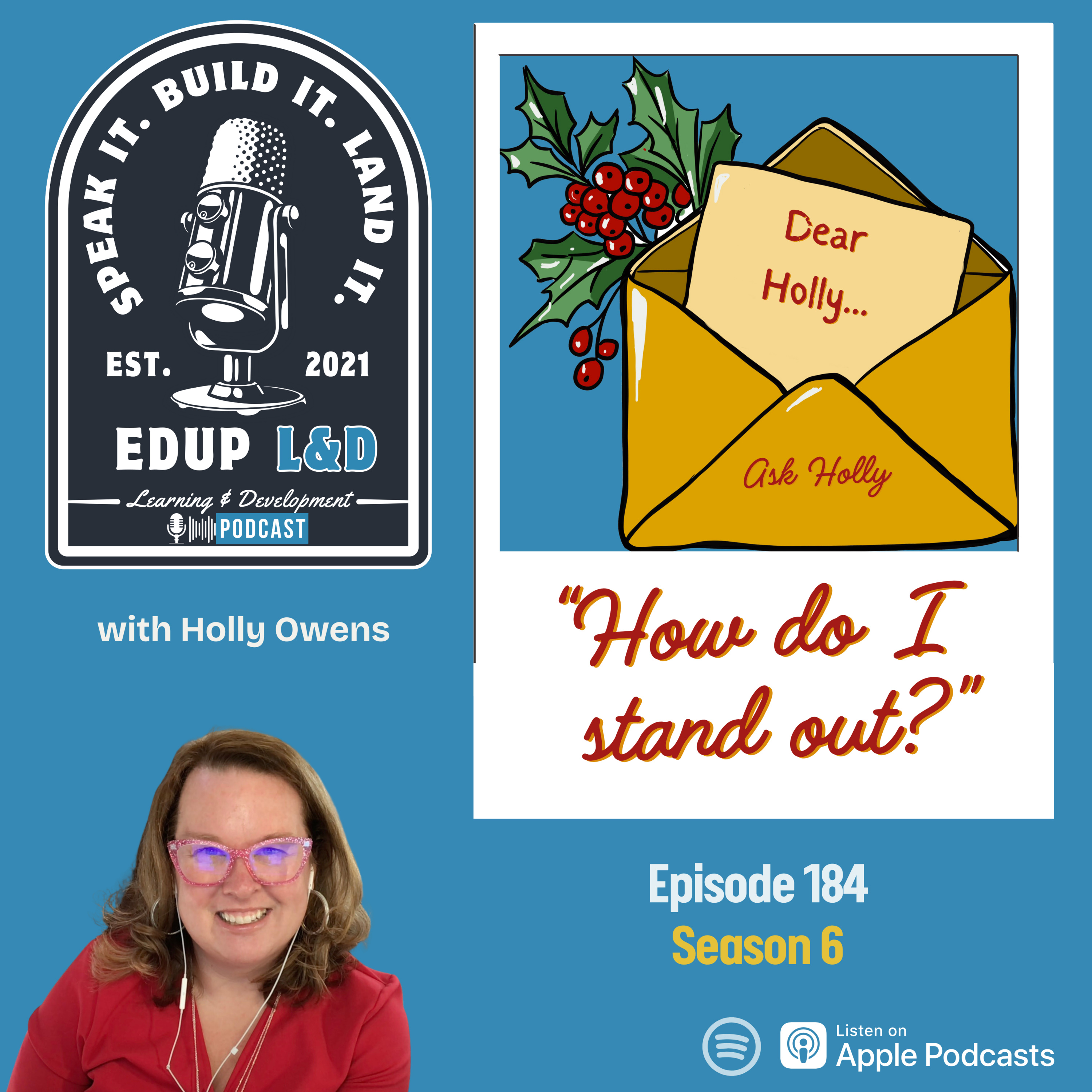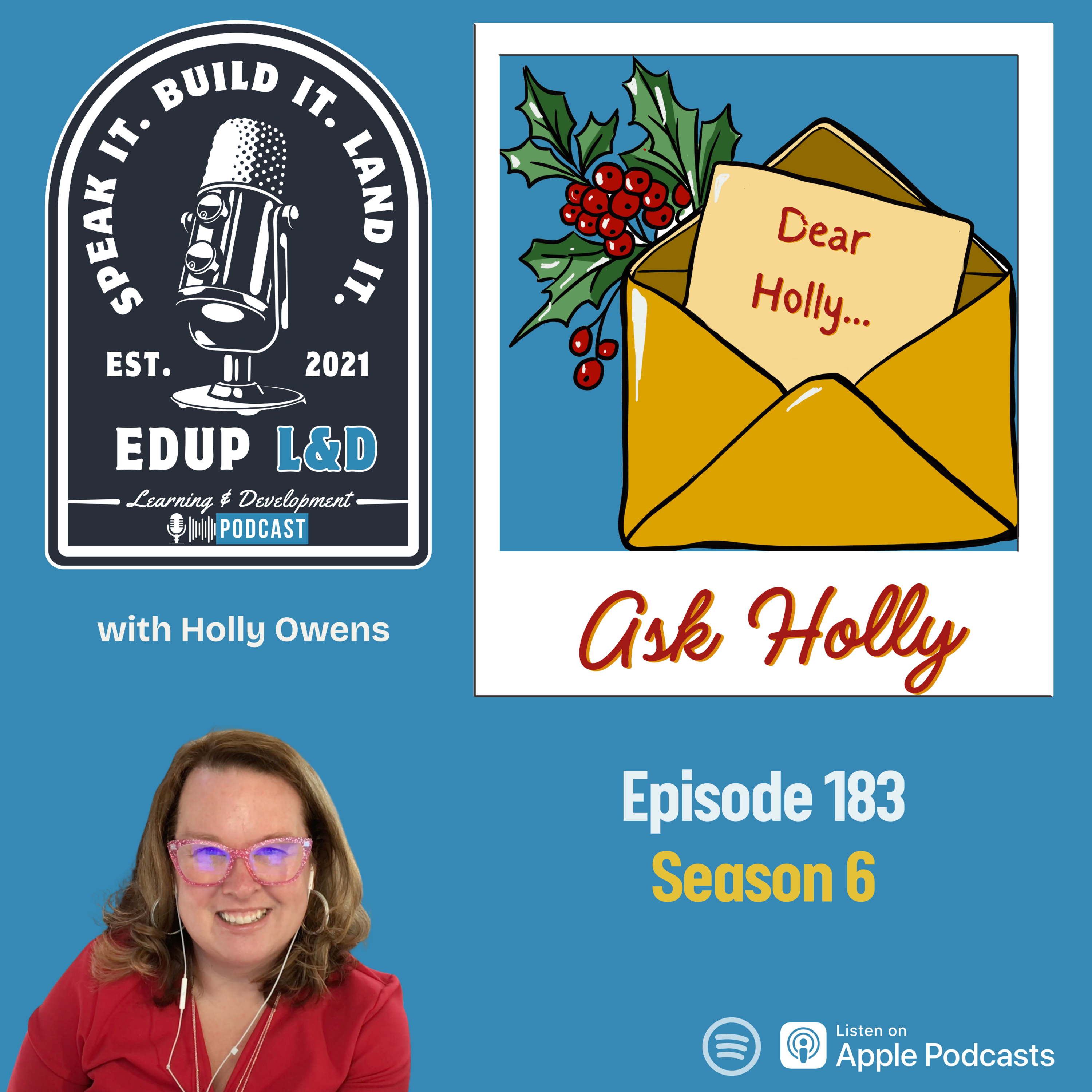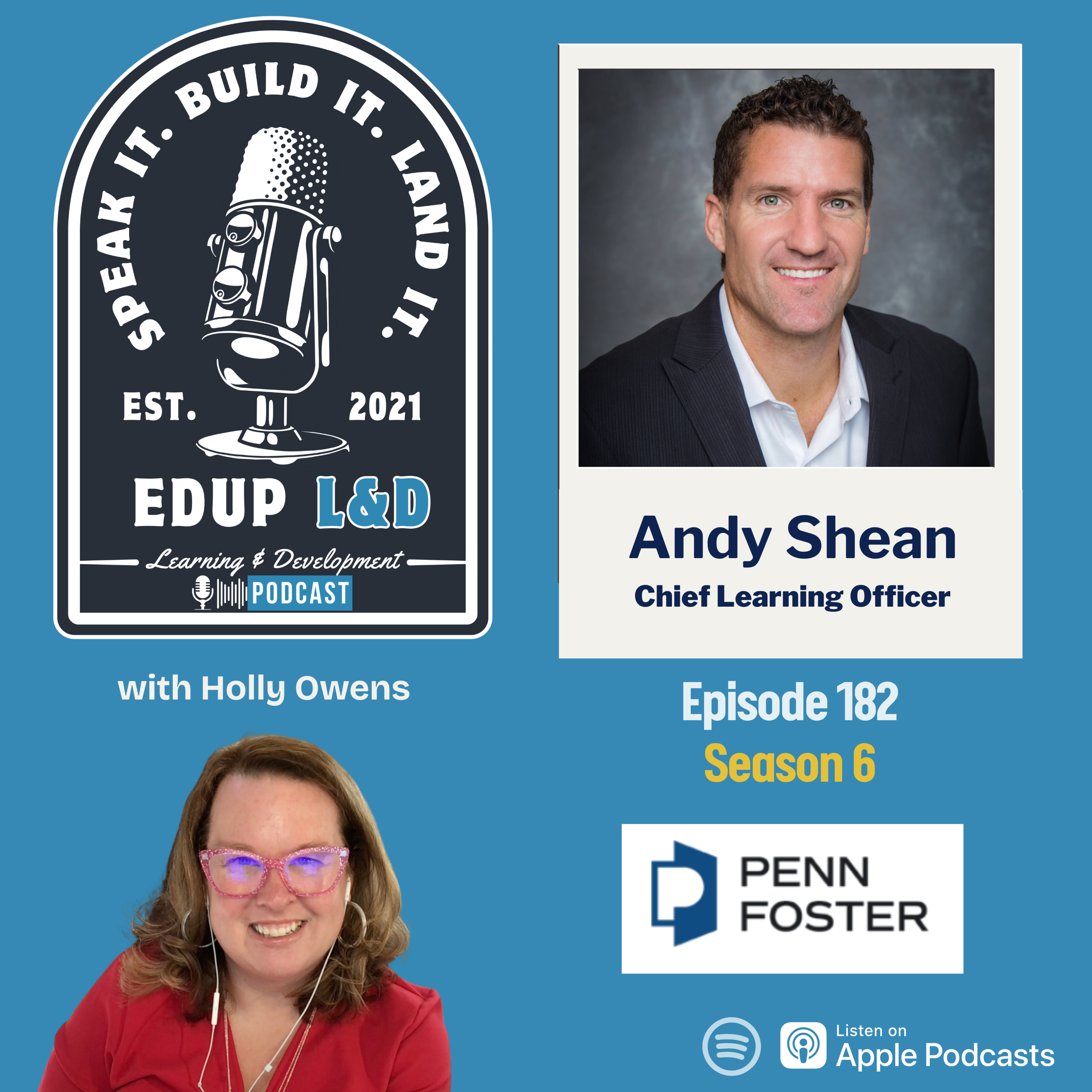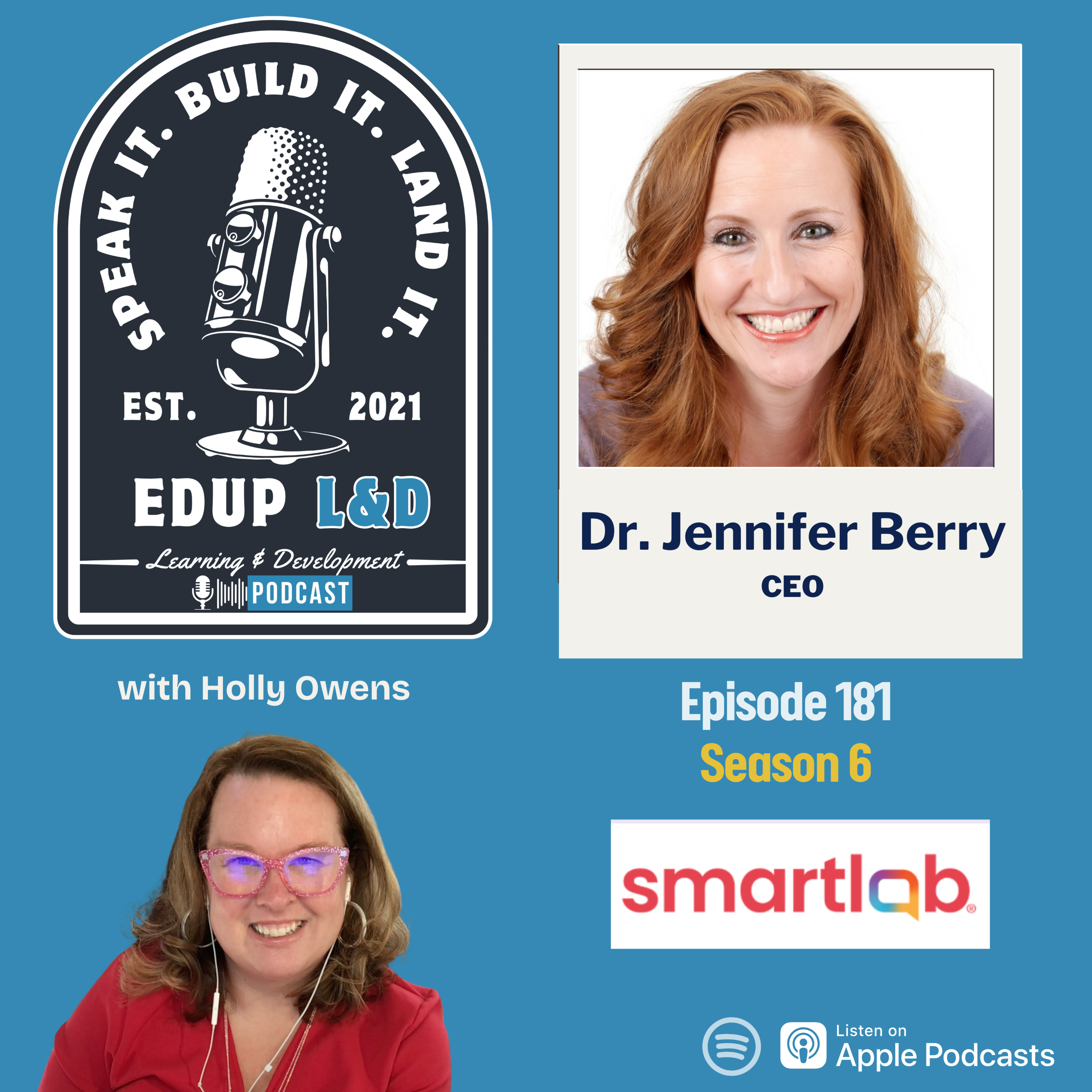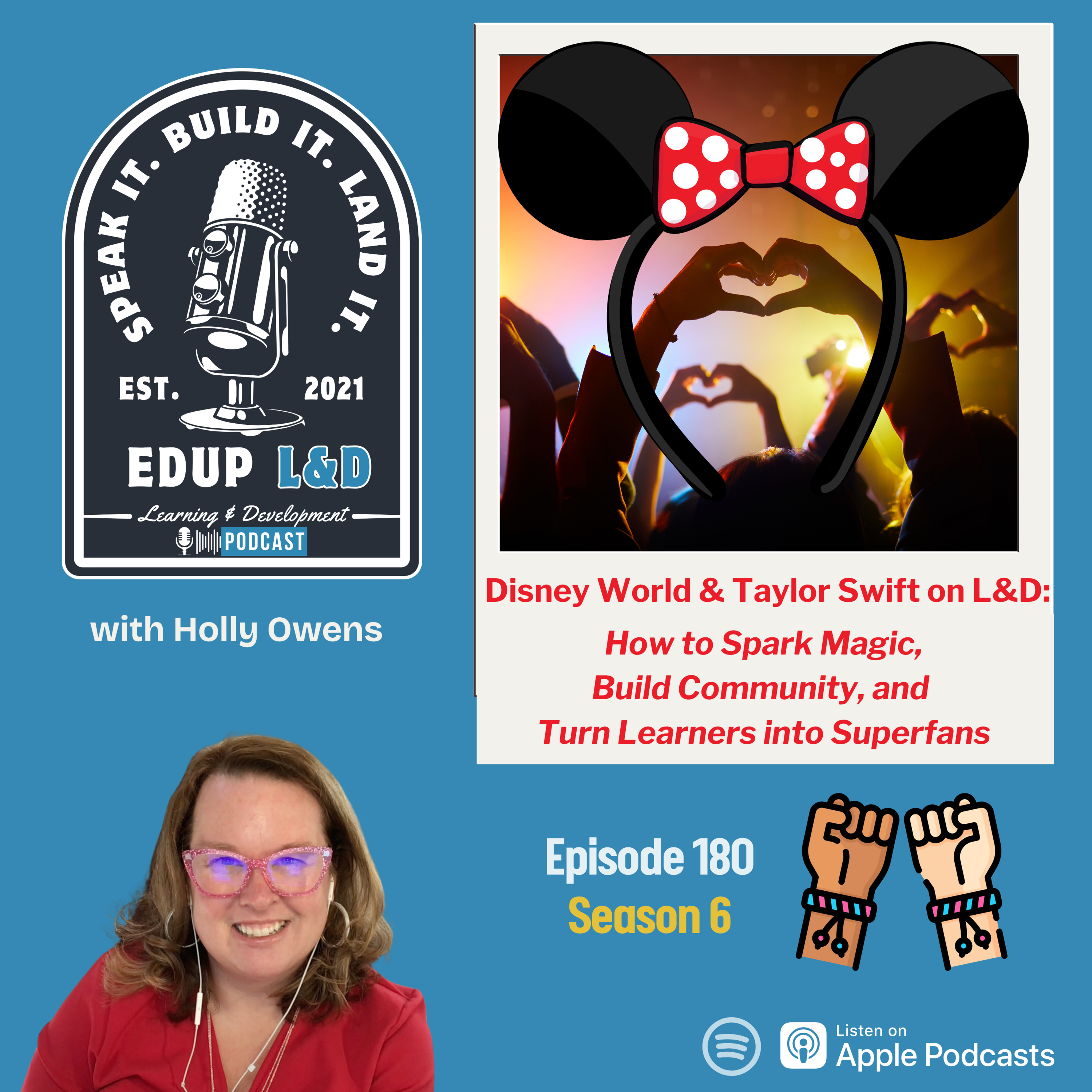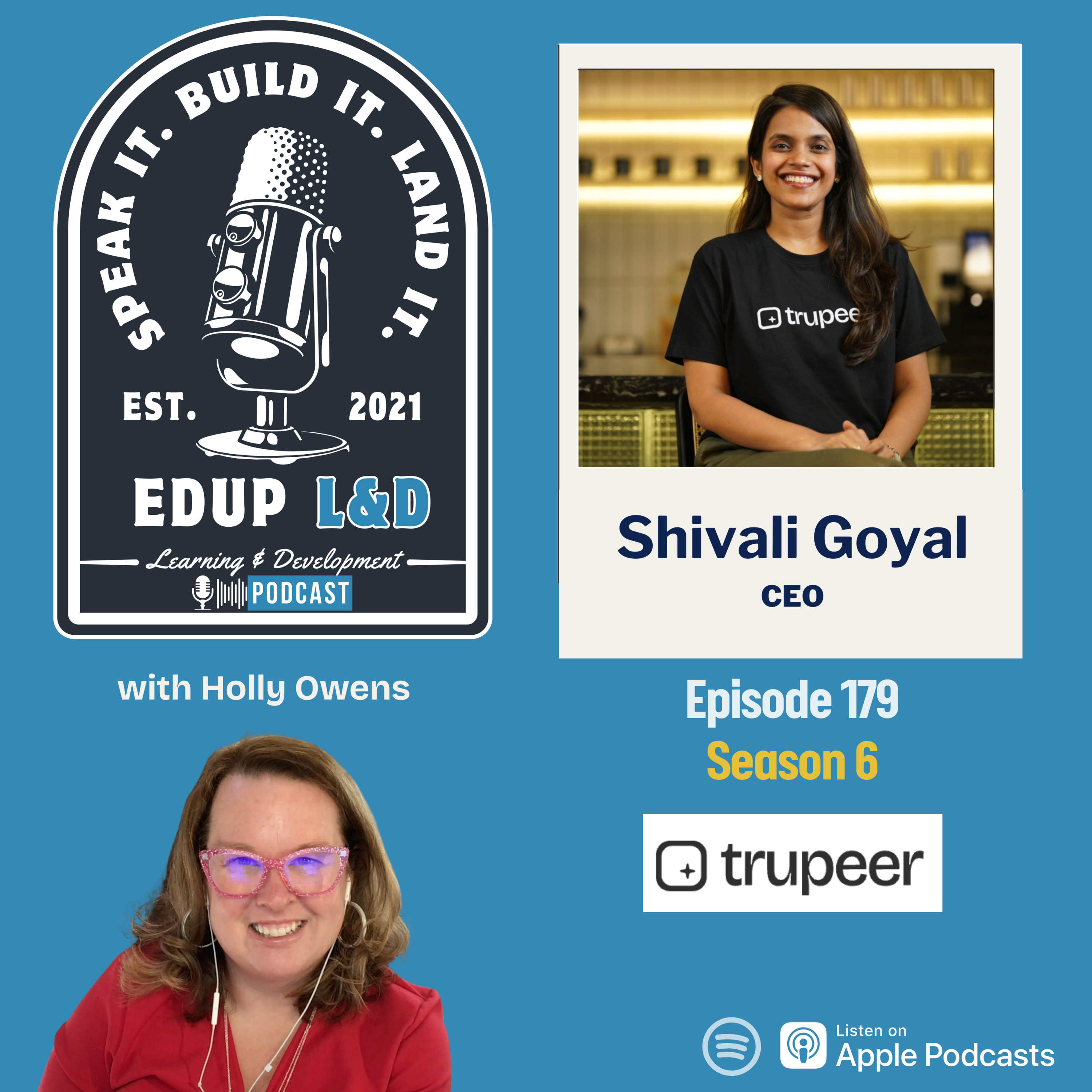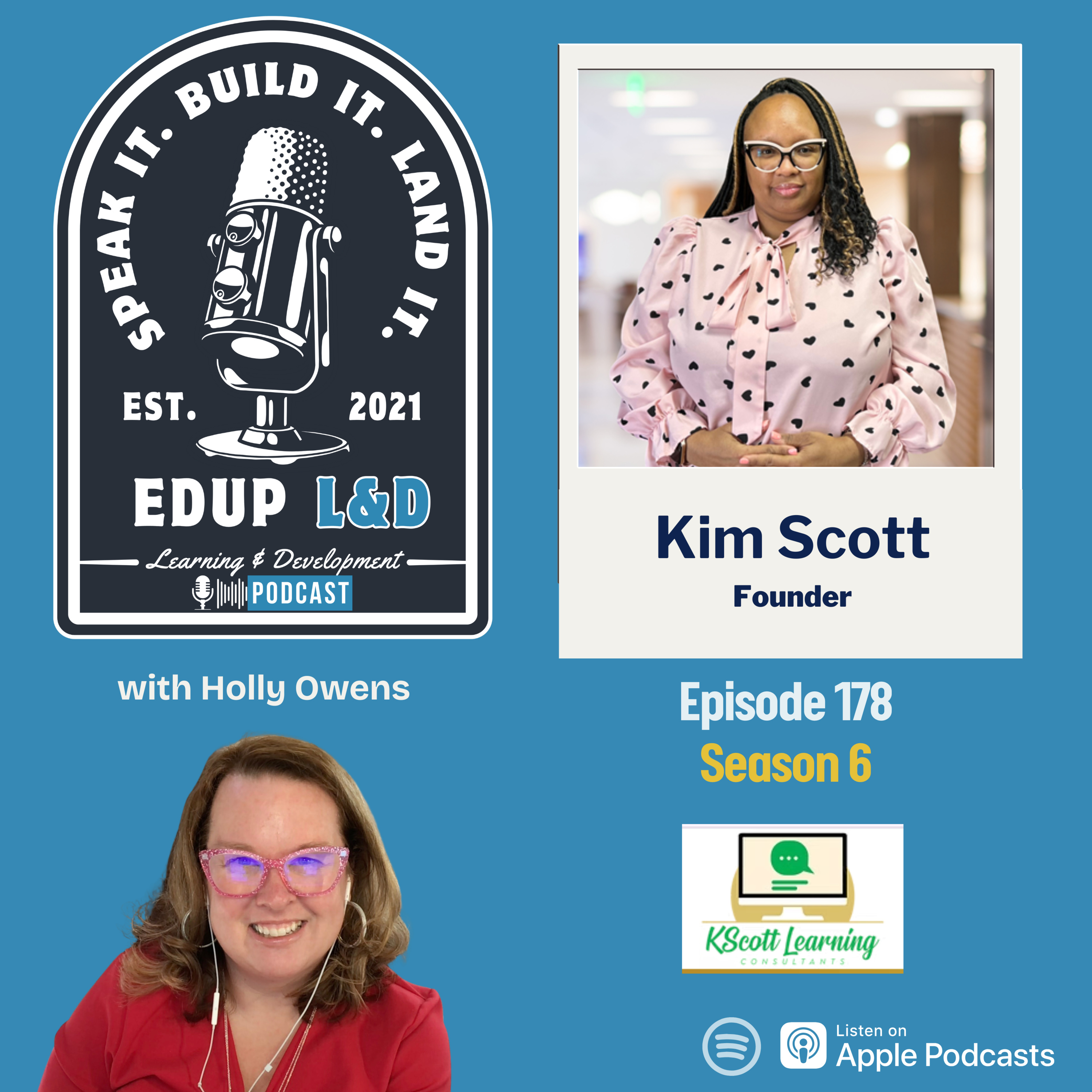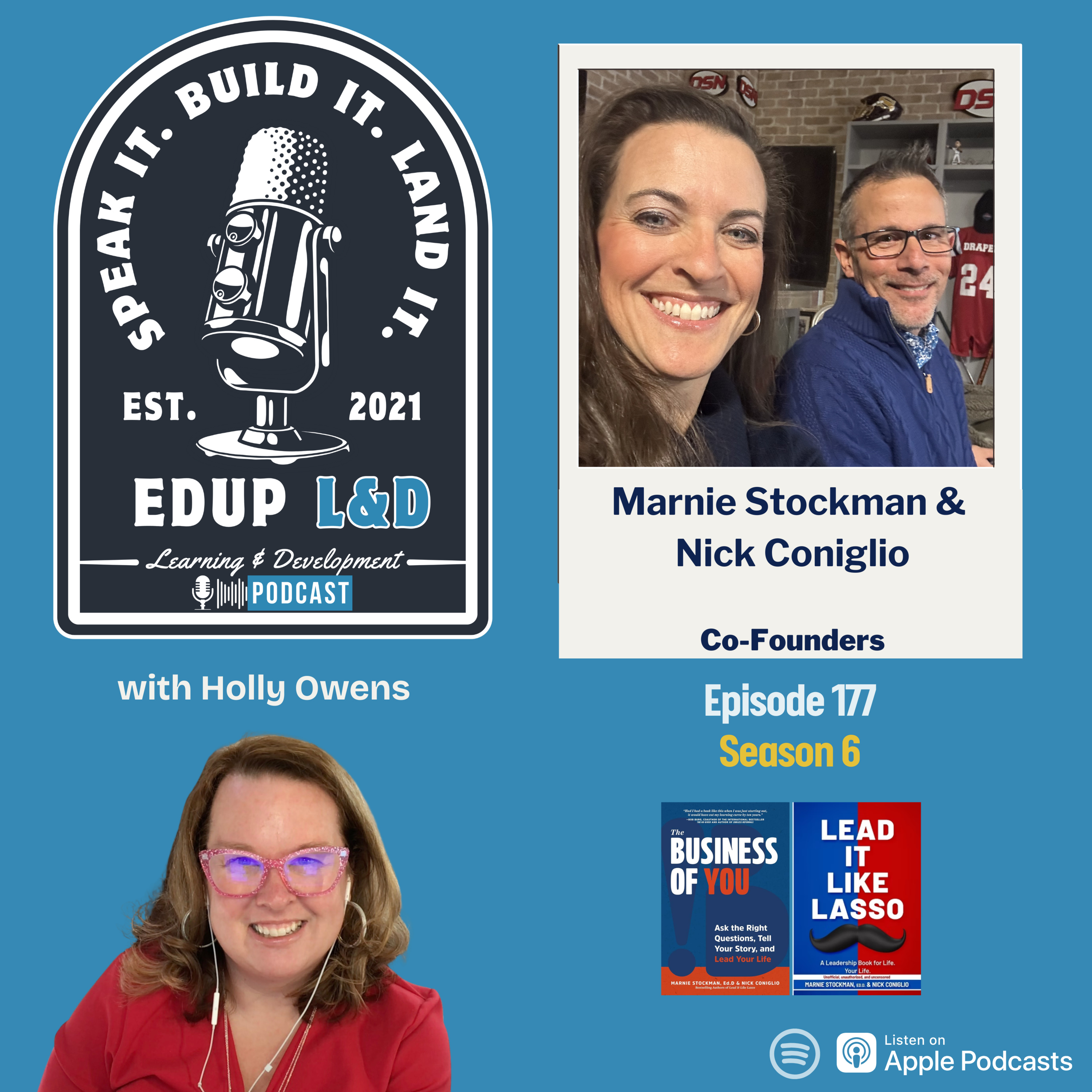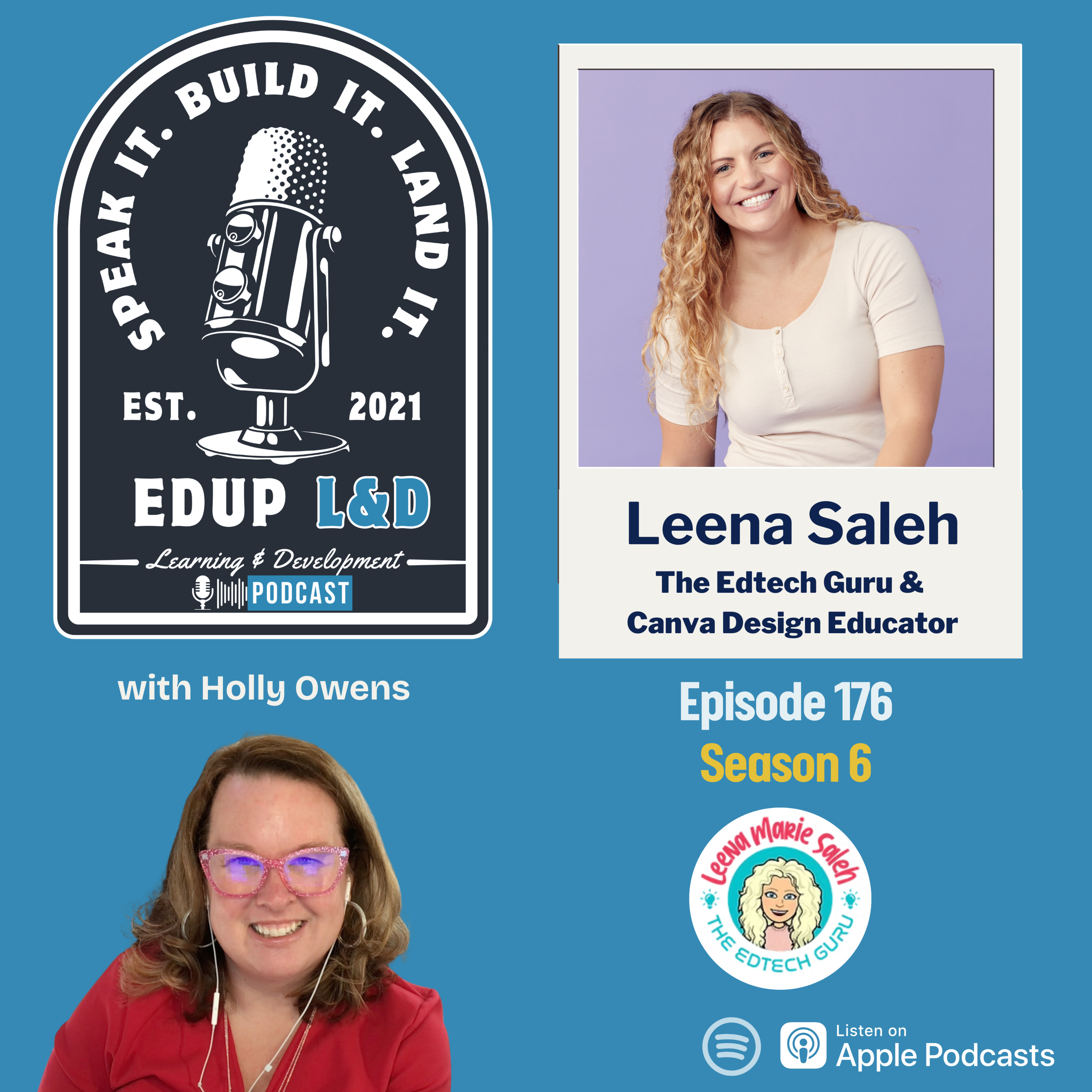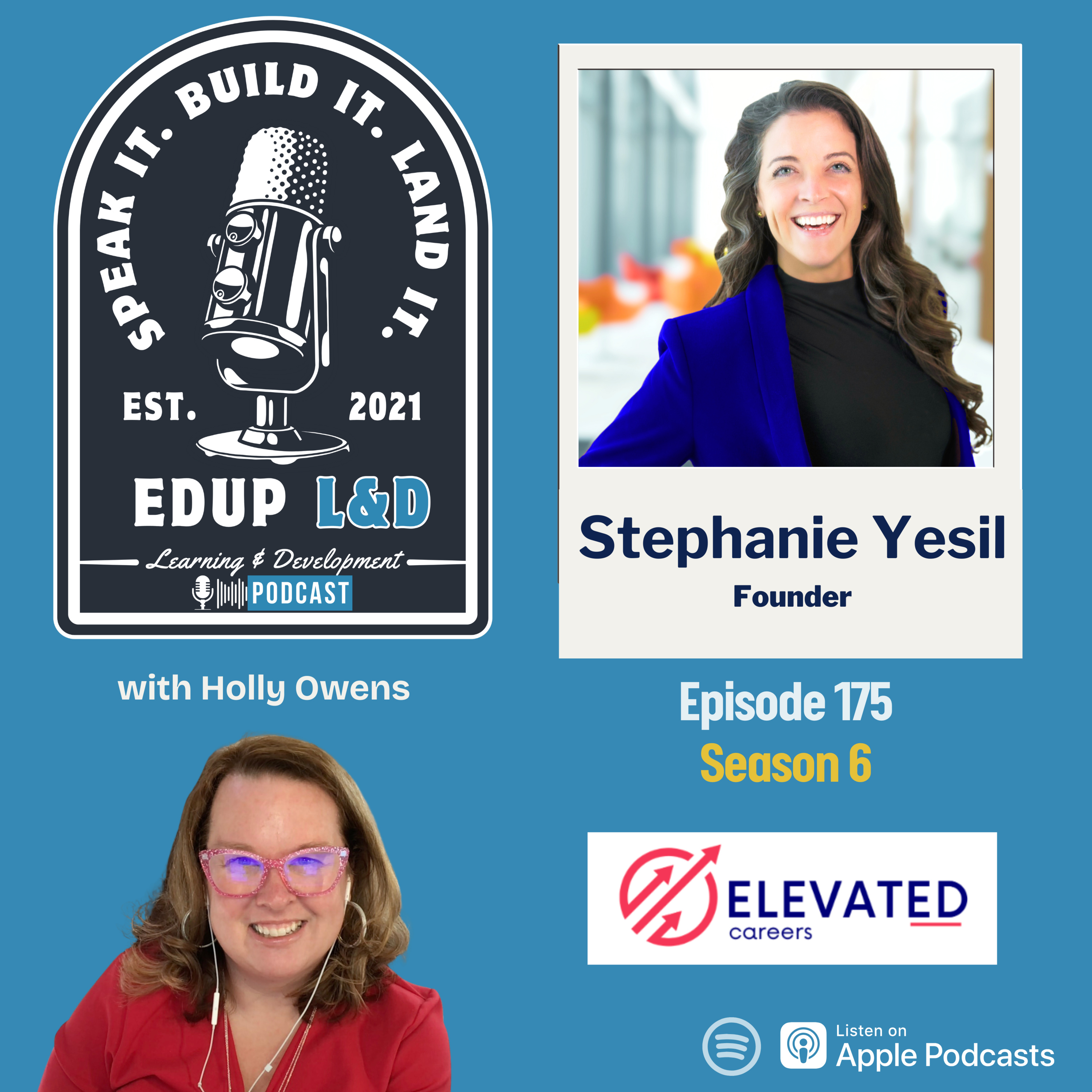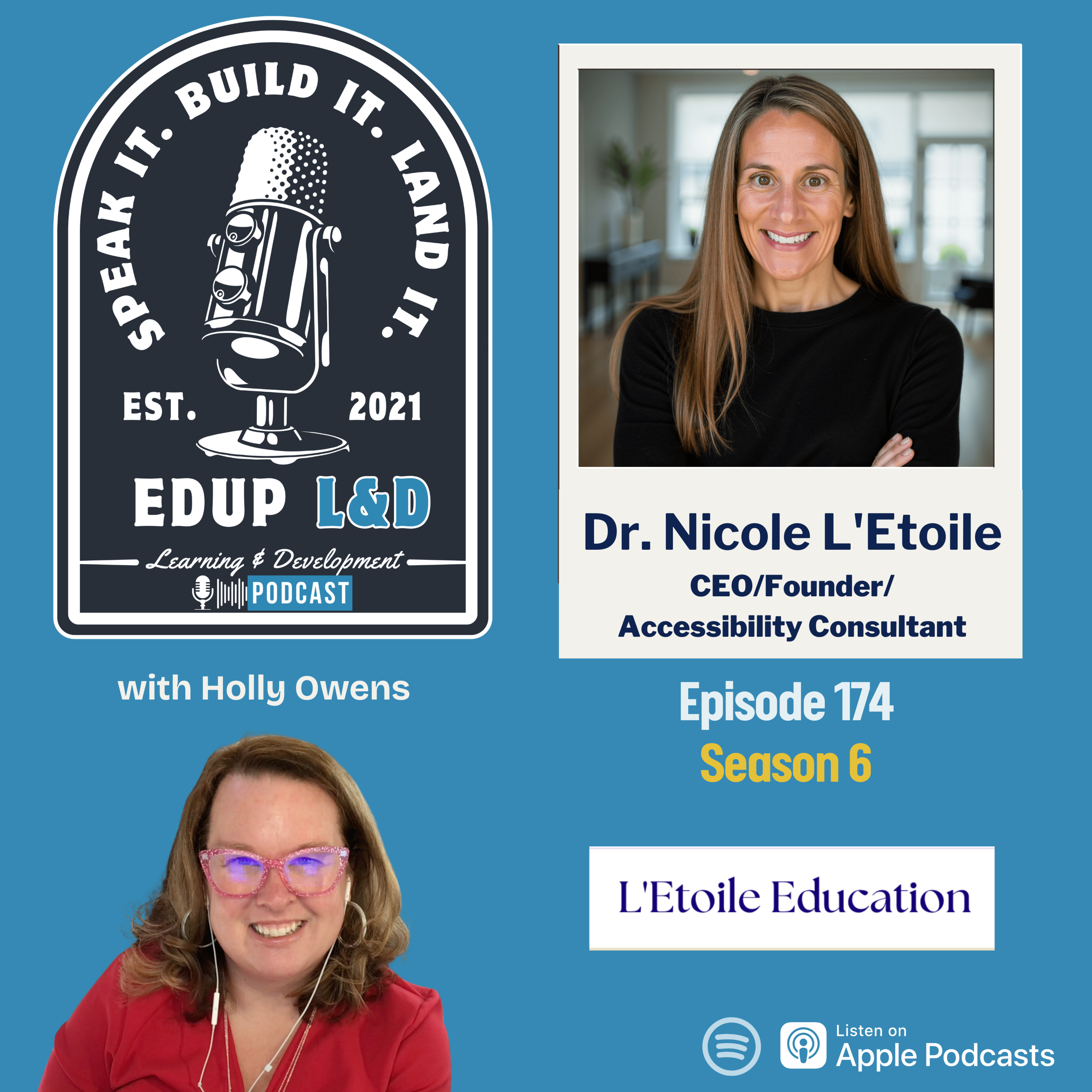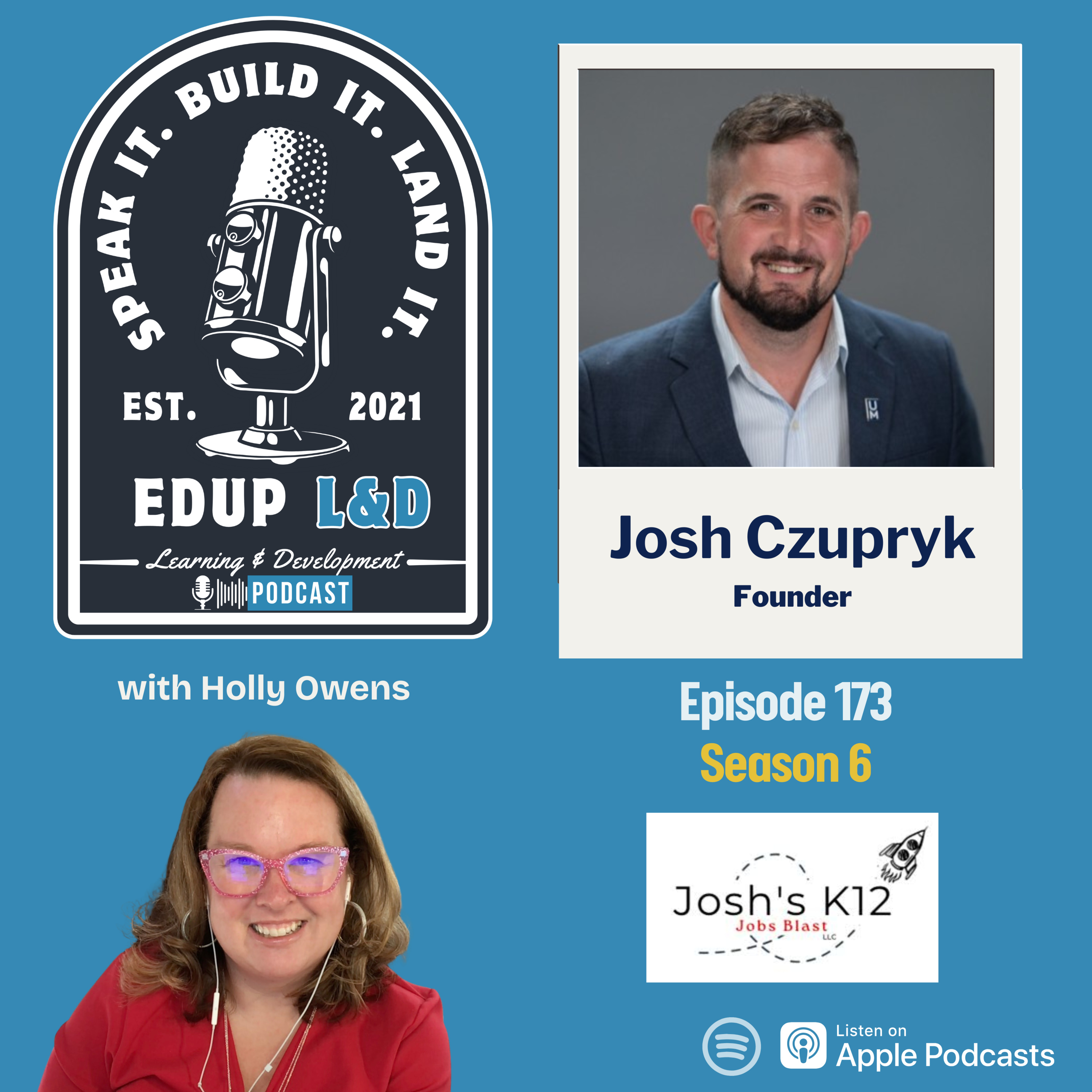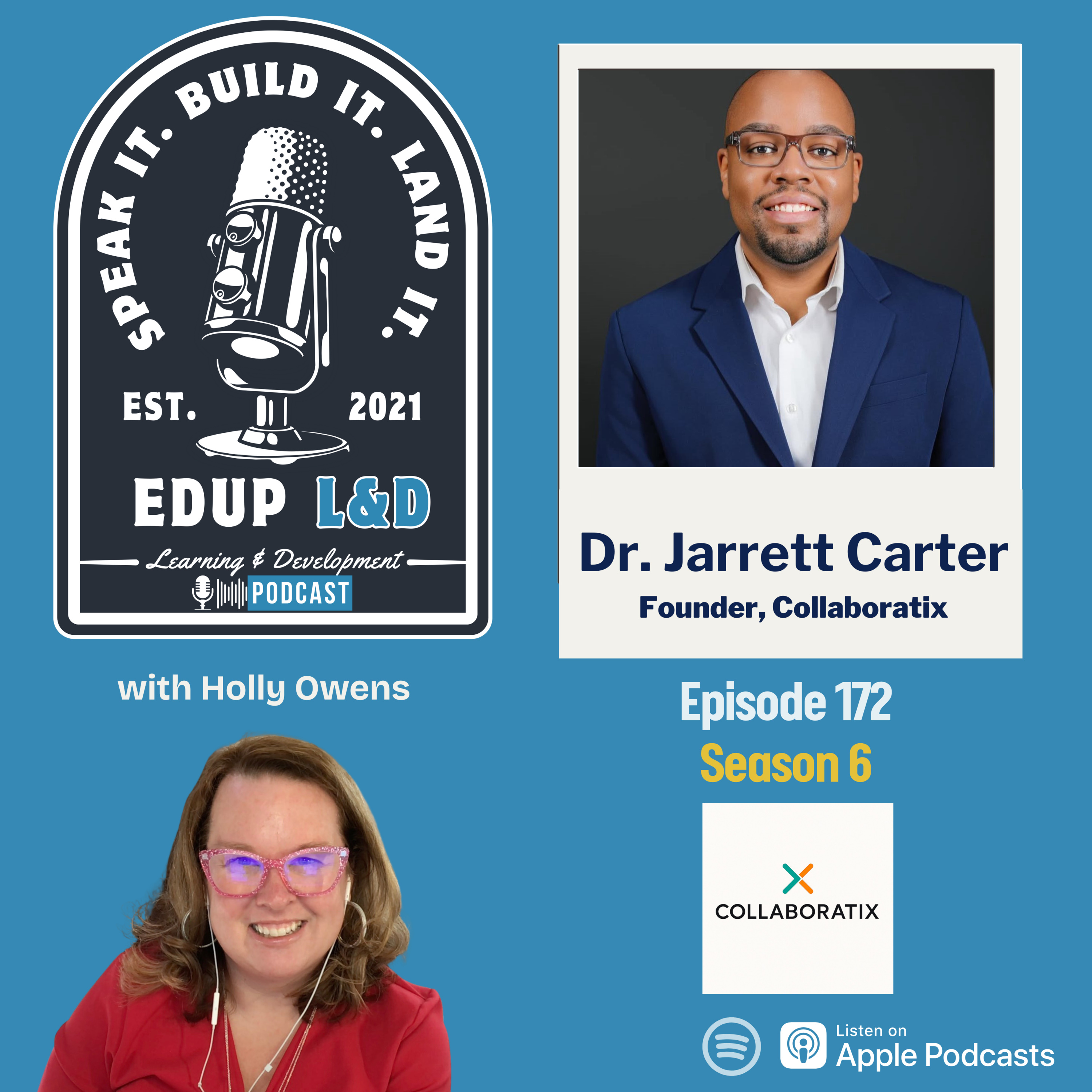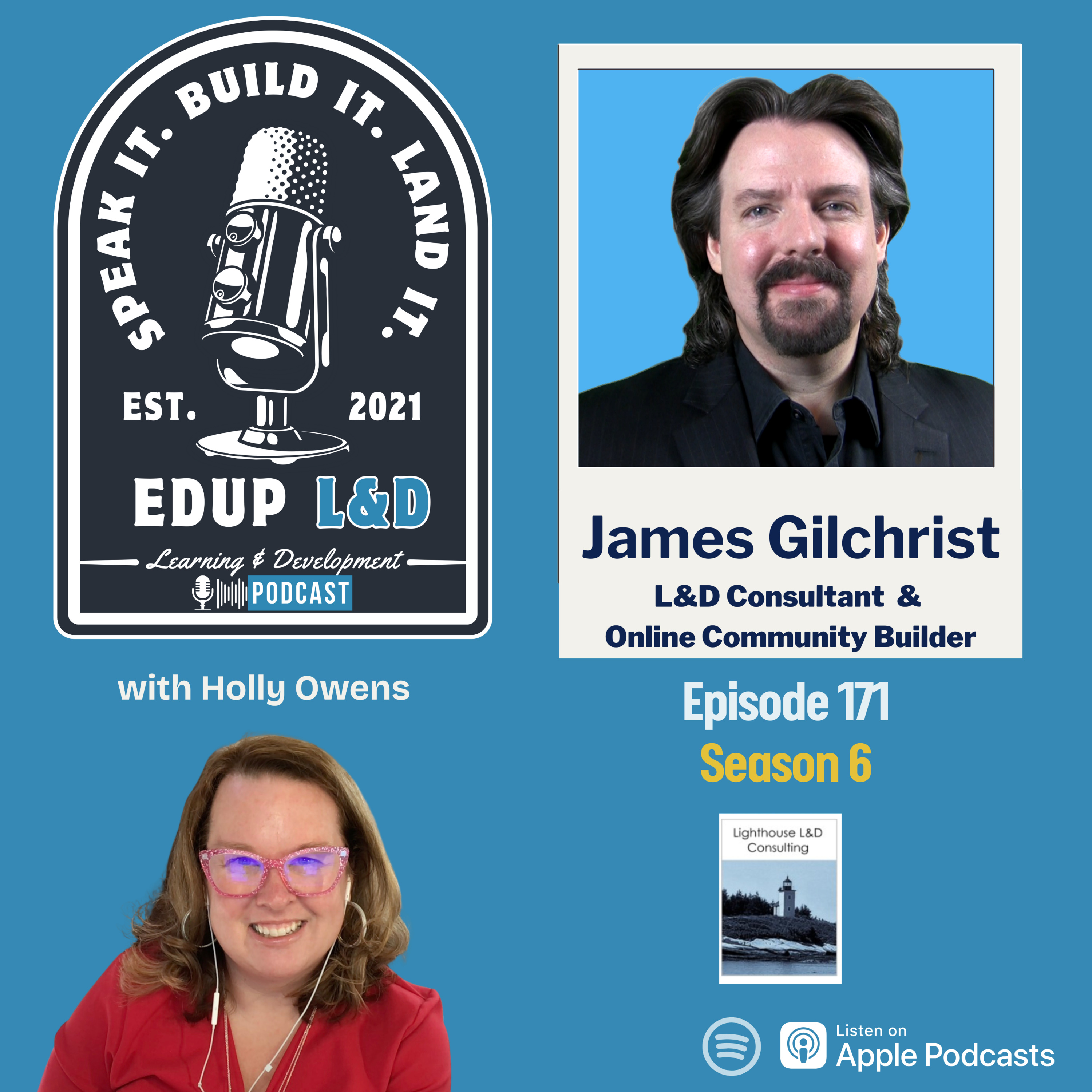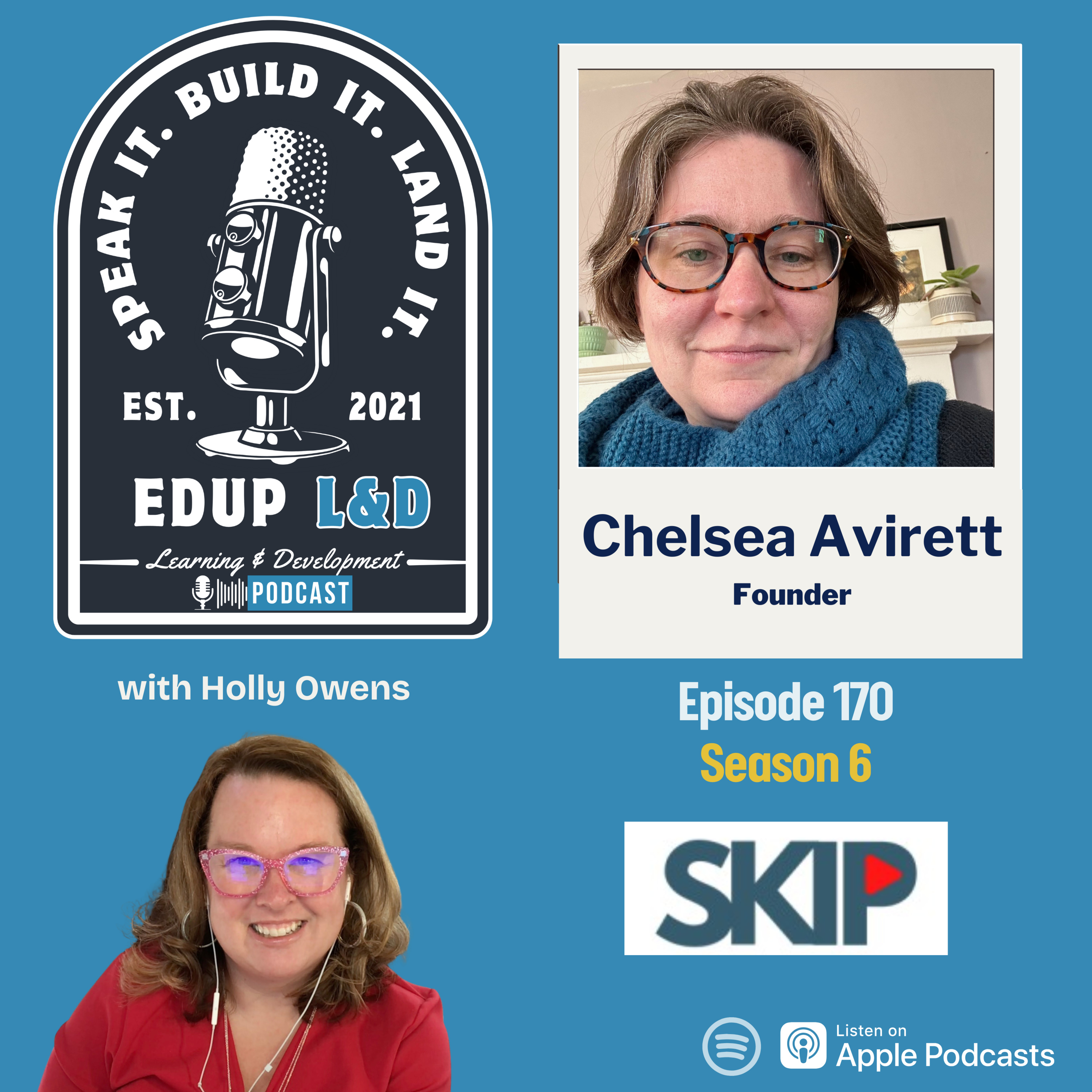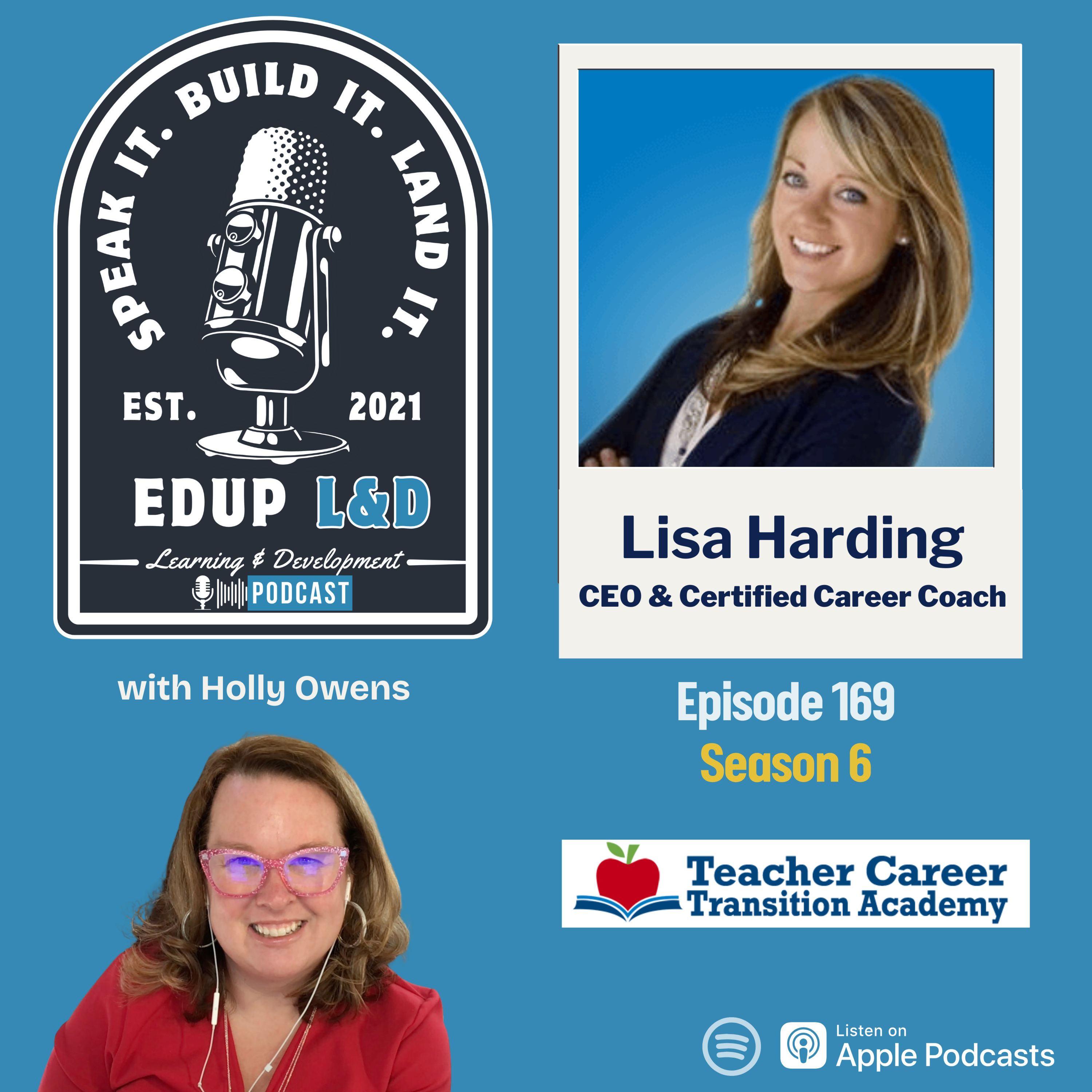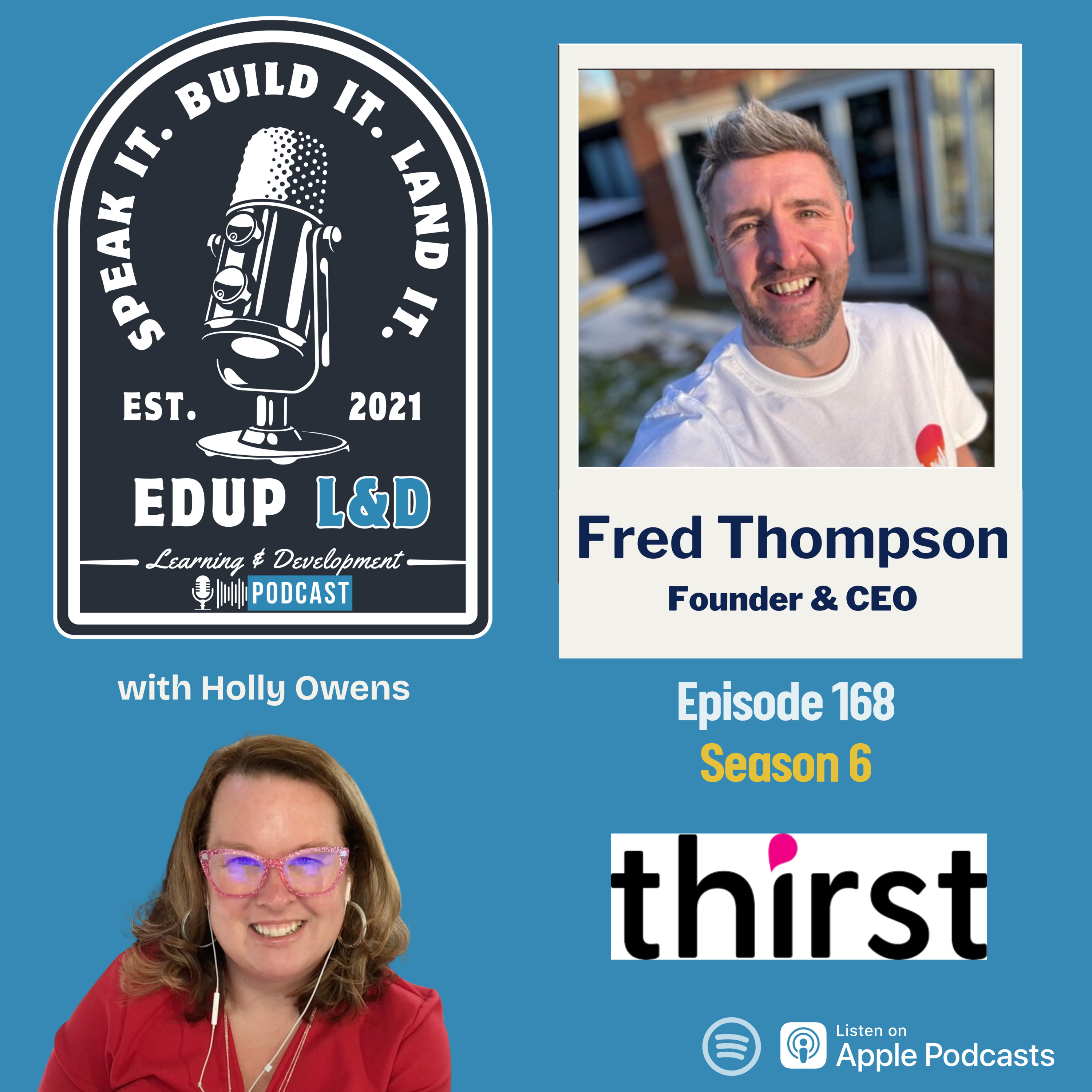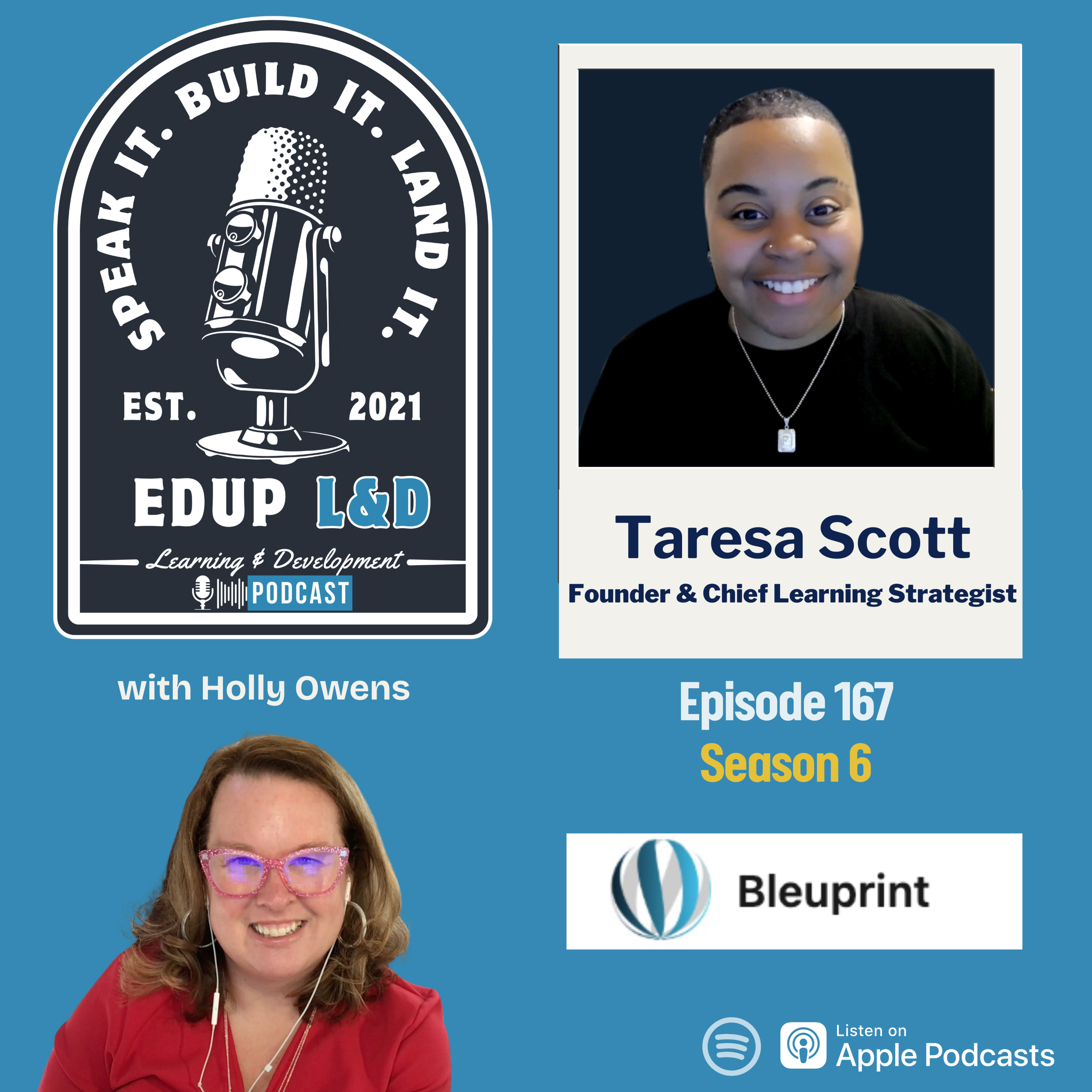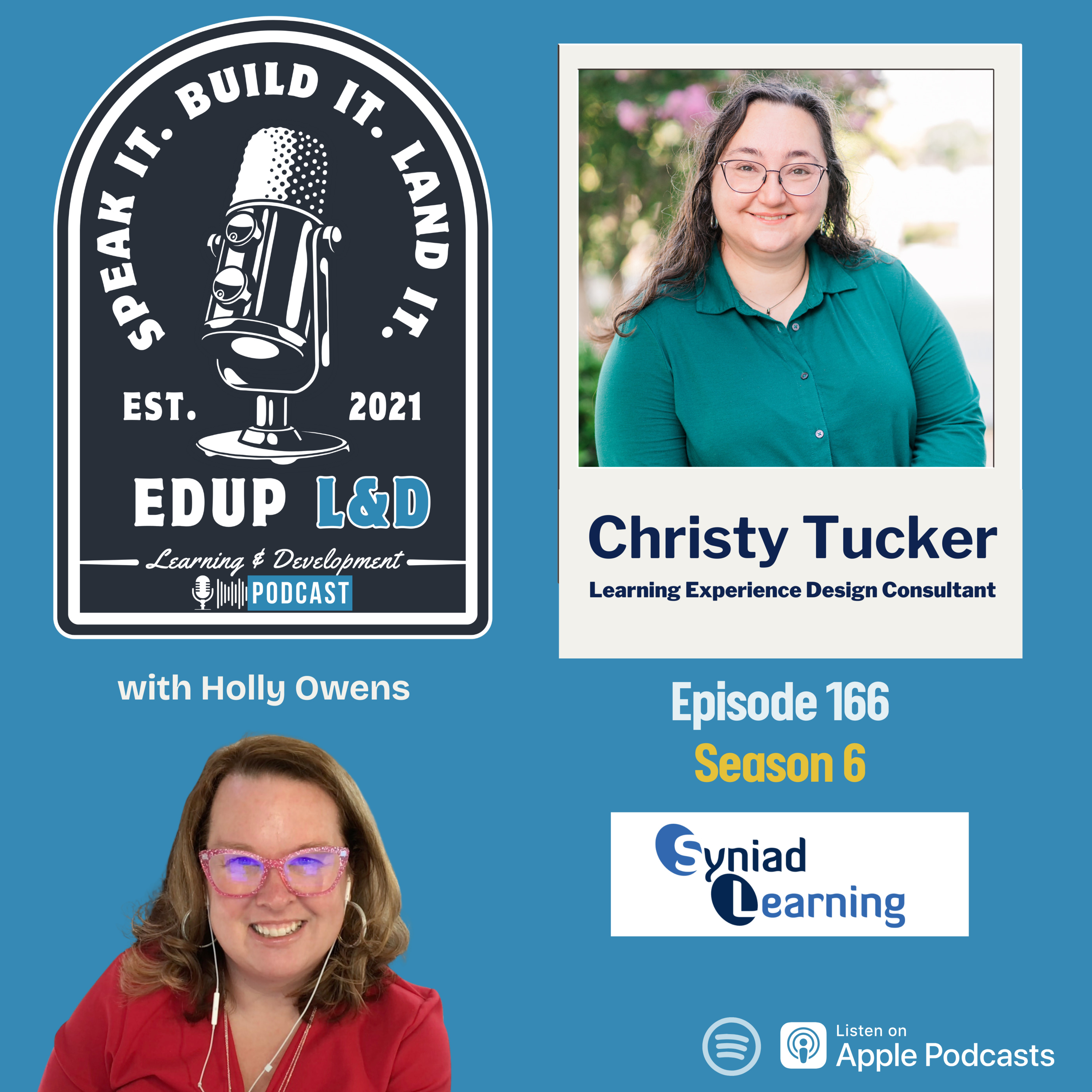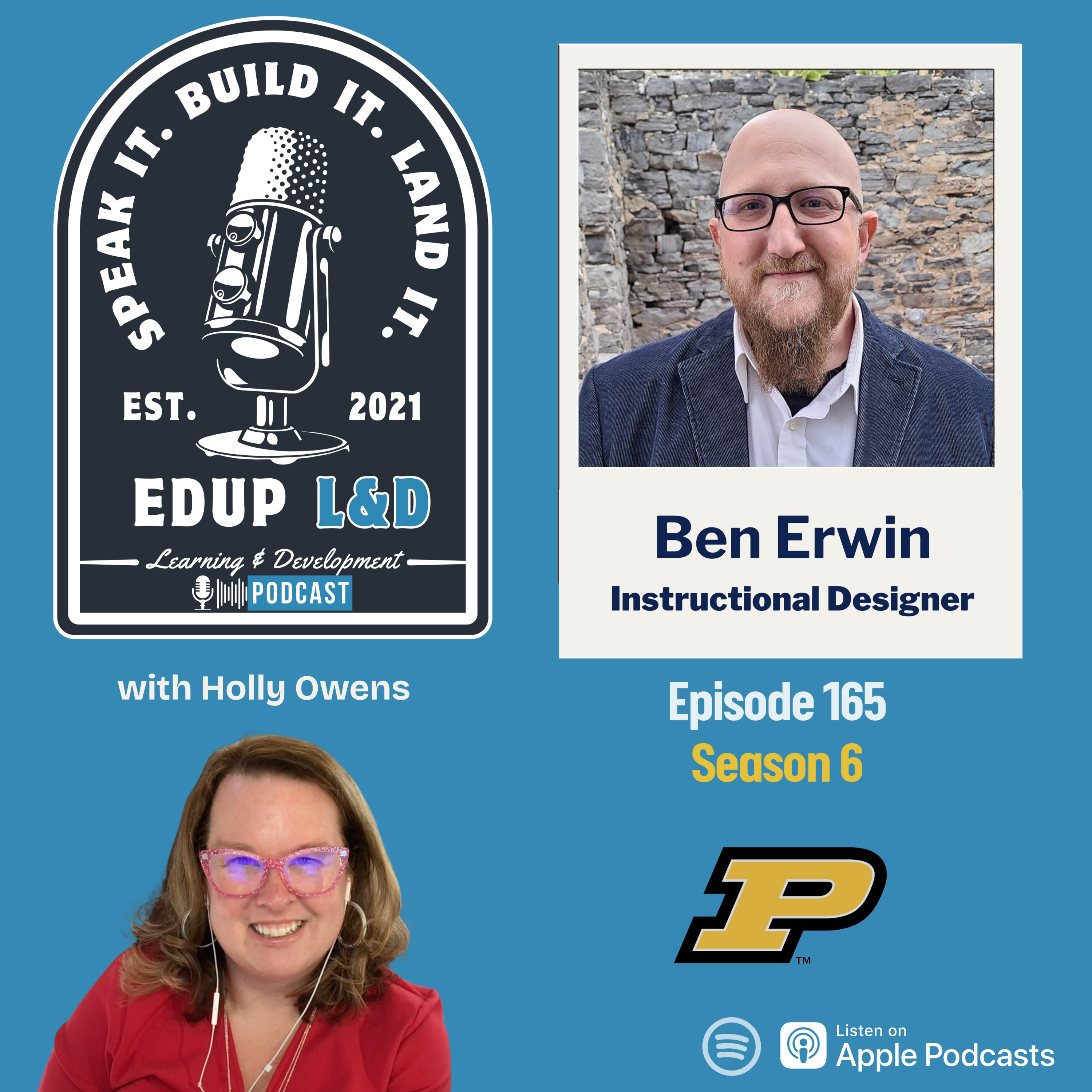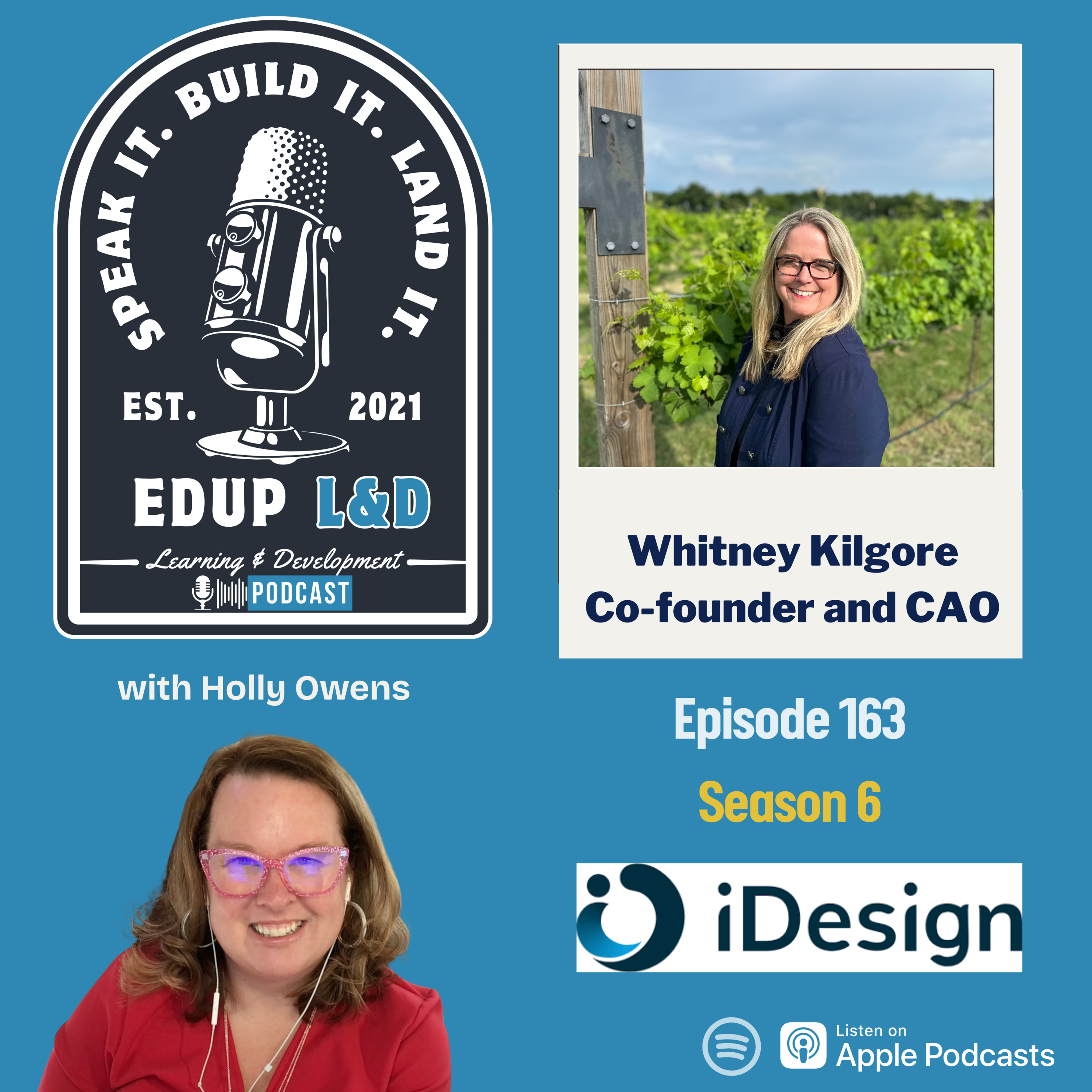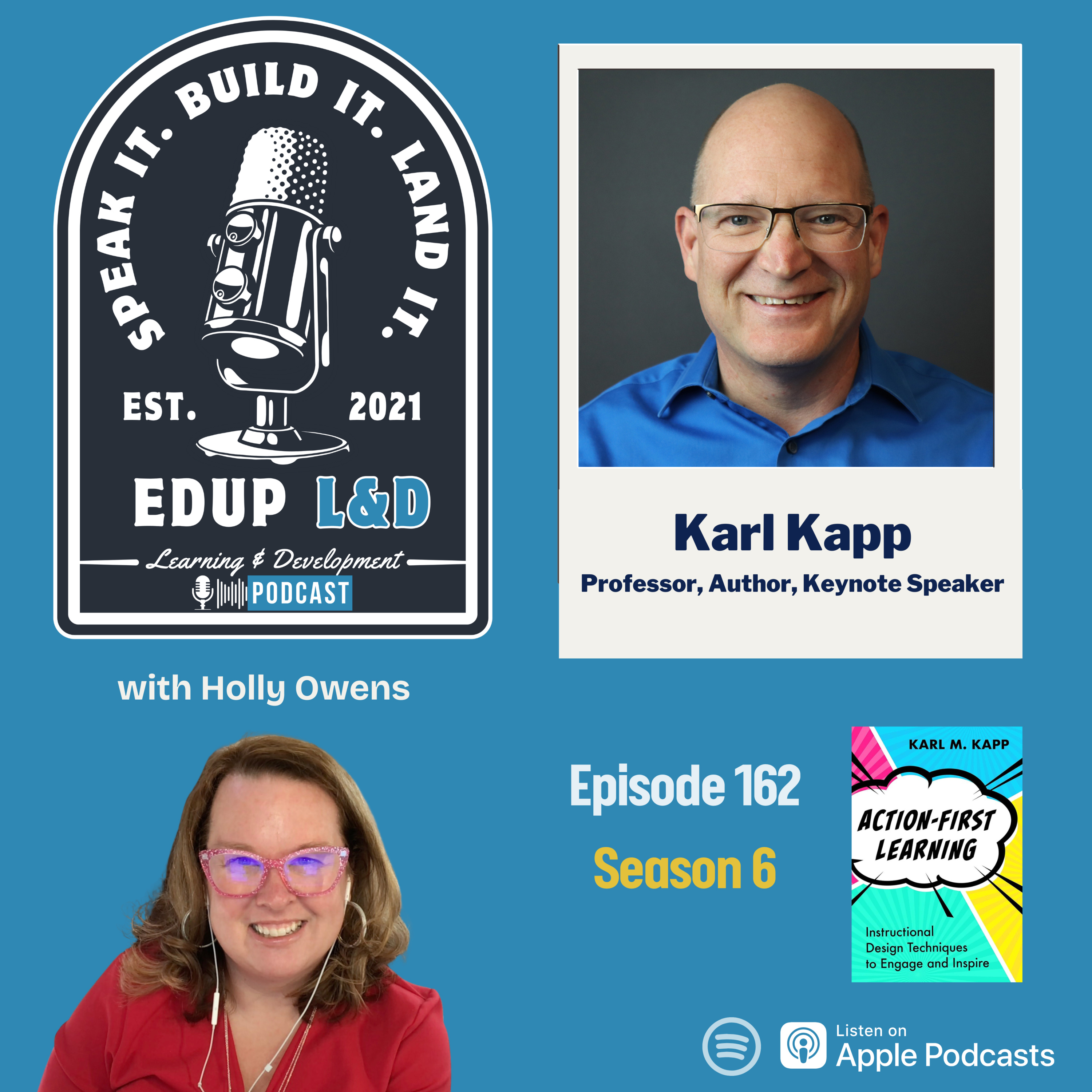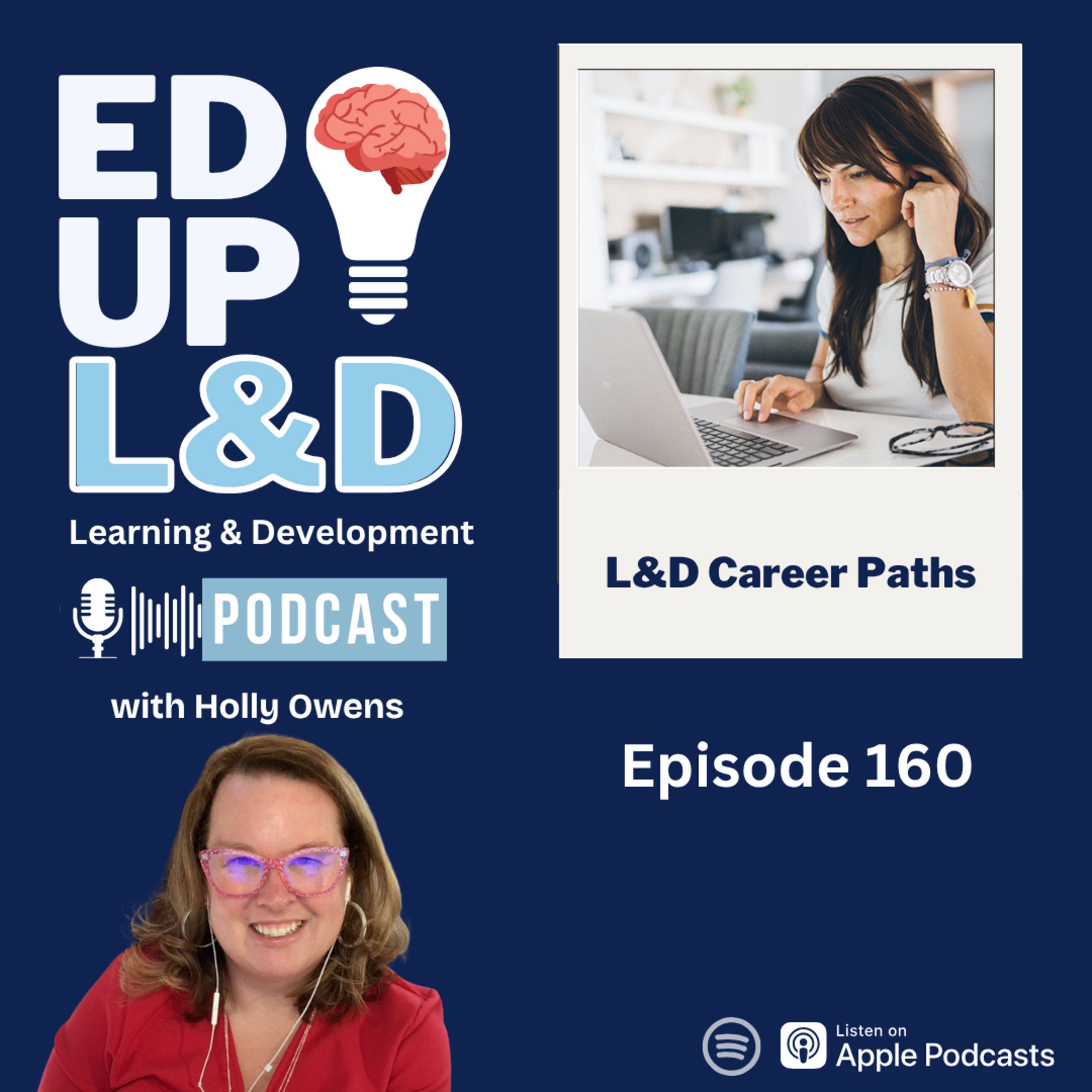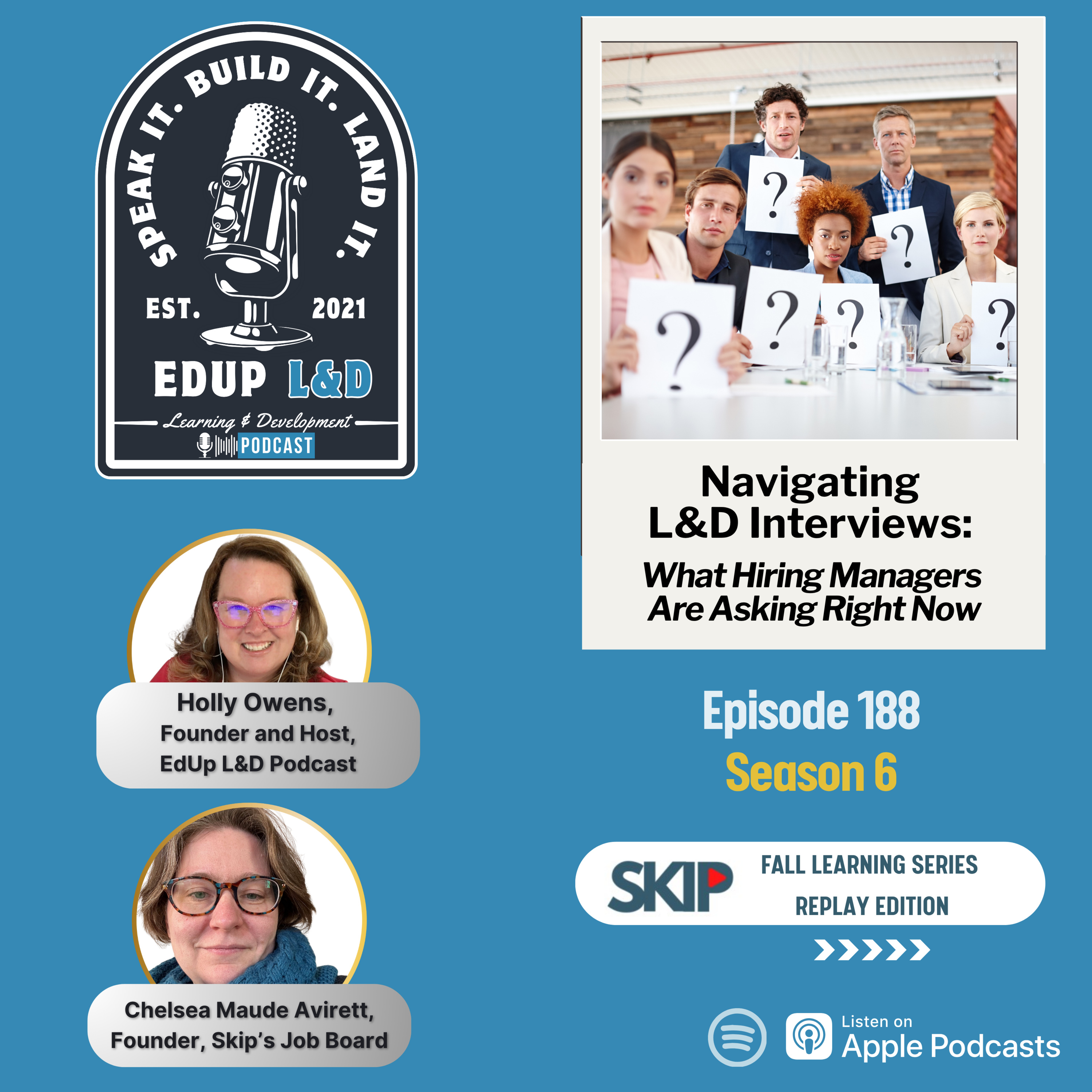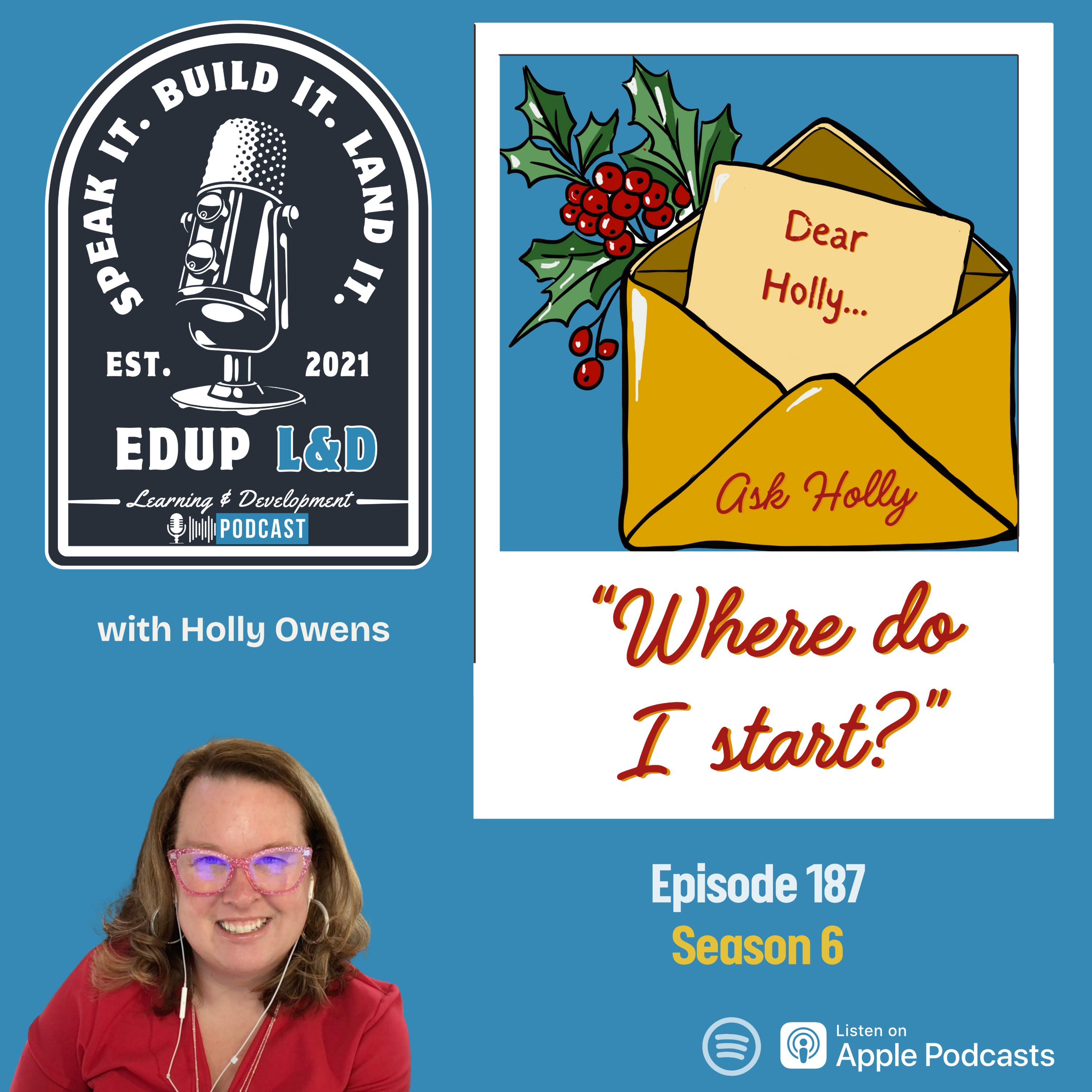
In this “Ask Holly” edition of the EdUp Learning and Development podcast, Holly Owens shares her personal journey and insights on navigating career transitions, particularly for those moving into learning and development roles. She emphasizes the importance of understanding one's direction, taking actionable steps, and building a portfolio. Holly also discusses the significance of community engagement and maintaining a positive mindset while overcoming challenges like imposter syndrome. The episode concludes with practical advice on how to approach job searching and professional growth.
In this “Ask Holly” edition of the EdUp Learning and Development podcast, Holly Owens shares her personal journey and insights on navigating career transitions, particularly for those moving into learning and development roles. She emphasizes the importance of understanding one's direction, taking actionable steps, and building a portfolio. Holly also discusses the significance of community engagement and maintaining a positive mindset while overcoming challenges like imposter syndrome. The episode concludes with practical advice on how to approach job searching and professional growth.
Ask Holly
Connect with Holly + Access Her Resources:
Grab your official EdUp L&D merch here:
___________________________________
Episode Sponsor: iSpring Solutions
🎙️ Huge thanks to our friends at iSpring Solutions for sponsoring this episode of the EdUp L&D podcast! 🙌
If you haven’t already, be sure to check out the iSpring Learning Exchange Community — a vibrant space for creators, educators, and L&D pros to connect and grow.
Thanks for tuning in! 🎧
Holly Owens (00:00.92)
Hello everyone and welcome to another fantastic episode of Ed Up L &D. My name is Holly Owens and I'm your host.
And today we're going to jump into another question, another Ask Holly episode. But before we do that, I want to be a little bit real with you. I have been kind of off the grid a little bit in the past few weeks.
Unfortunately, on October 2nd, my grandfather passed away from lung cancer at the age of 85. Yes, he lived a wonderful life. You know, we're very grateful to have him as long as we did, but it's still been very difficult for me and my family.
So that's been happening in the background and something on a happier note. I got married to my partner Will on October 13th. So that's a bright spot in what's all going on in the world. You know how life is. It doesn't just wait and put things in linear fashion. But I just wanted to say that I really appreciate all the support of this fabulous community. sent out some emails and people responded with their support.
and saying things like how sorry they were and congrats and take your time getting back into things. So before I jump into today's episode, I just want to let you know that I am human and as much as learning and development and instructional design get me excited about things, I experience life as well.
Holly Owens (01:43.576)
But I'm happy to be back with you today to talk about this next question. So let's dive into it. I think this probably should have been the first episode of Ask Holly. Remember, that first episode is how do I stand out? Because that's a question I get asked a lot during my webinars, during in LinkedIn DMs. But I think this question is definitely another one.
in the top five of questions that I get asked. just thinking about, if you are, for example, I love my transitioning teachers group. And if you're sitting in a classroom right now and you're like,
You're just at your wits end. You think you've outgrown the role where you just want something different. You want a better work-life balance. You want to be able to take your experience in education and apply it. And I think this is a question that people often start with, especially coming out of the classroom or any sort of profession and thinking about like, you know, what's the path? That's not the question, but what do I do?
So one of the things that I often think about is that when you are transitioning out of a role and into something else, a different career, a different role, maybe it's linear, maybe it's not, maybe it's a promotion, or you're just thinking about a change in your life, the question that you normally ask yourself is where
Do I start? Where do I start? It feels like you're climbing a mountain that's you summoning is unattainable, like when you're transitioning. can say that for a fact, especially most recently transitioning out of full time into freelancing. So.
Holly Owens (03:58.508)
Where do I start is the question that I want to address today. One of the things that people commonly do when they're transitioning out of roles and looking for something in learning development is they're like, I want to fix my resume. I want to apply for jobs right away. want to eat. No. You need to take a step back.
because you're coming out, especially transitioning teachers, you're coming out of a position, you have some emotions about that, you're starting something new, you may be in territory that you've never been in before, you're trying to figure out your way through it. So before you even go anywhere, where do you start?
You need to figure out number one where you're going, where you want to be, where are you going? You're not going to get in the car and drive somewhere where you don't have the directions to, to a place you've never been before. I mean, you can get the maps out and stuff, but just saying you're not going to just go drive off and try to figure it out from there. You're going to want to have a plan. So one of the things that people should ask themselves is where do you want to be?
Transitioning into a role in learning and development is something that you really have to think about because learning and development the sector is so Huge it's huge. You have higher education. You have corporate you have government you have freelance you have nonprofit you have other different areas that people get into that may be learning and development adjacent like edtech so you have to figure out where you want to be
So that comes with doing some research about roles. About like what do you like? What do you like in a role? Do you want it to be remote? Do you want it to be something? What's your salary expectations? Other things that you want to consider like what...
Holly Owens (06:06.603)
Like hours you want to work. Maybe you want to go into freelance world because you want to set your own hours. Or maybe you want something that's more like nine to five because you like that sort of structure. Or maybe you want something hybrid. So it feels very foggy at the beginning. There's a lot of questions. The question, where do I start is a loaded question. So you're telling yourself, I want to move into learning and development. Learning and development itself.
isn't just one job.
It's an entire ecosystem like I'm saying. You've got instructional designers building online courses. You've got facilitators leading live trainings. You've got LXDs or learning experience designers focused on behavioral change in the learning experience. And there's even other types of roles like in operations, enablement, talent development, coaching. I've done marketing. Now this is just my list. is a...
a list of everything, consulting, content strategy, learning analytics. So figuring out where you want to be, really you have to dive a little bit deeper before you start filling out those applications. So thinking about...
What kind of work lights you up? What are you passionate about? Like I love doing this podcast. I love talking to you through the screen. It's a little bit weird because there's no audience. know, normally I have a guest, but I love talking to people. I love sharing my experiences and telling you what not to do and what I did in my path. I love teaching others, so I still teach things like that. Do...
Holly Owens (07:53.454)
You have to consider also too, do you want to create learning experiences behind the scenes, like as an instructional designer, because you really are the stagehands that are setting up the props for the learning experience, or...
Do you like being in front of people? Do you like facilitating conversations? Do you like maybe being the instructor in the room who is talking about the course? You're the trainer. You're doing the train-to-trainer stuff, maybe virtually. Think about it like this. Are you more creative, analytical, strategic? Are you more people-centered? This becomes your map. Once you know the direction you're going,
the next steps for you actually start to make sense. Like all too often I get people asking me questions like, I'm applying to 200 roles or I've applied to every single thing that's popped up on LinkedIn or every single thing that's popped up on Indeed and I haven't got one interview. I tell people that's because you can have 800 lottery tickets.
and you can have 500 lottery tickets or 50 lottery tickets and you still have the same chances of winning. So putting multiple applications in and praying and hoping that that gets you the role is probably not a good strategy. So you need to know your direction.
So here's a little story. When I was first thinking about transitioning out of teaching, had no, instructional design, it was there, but it really, it wasn't like a part of the mainstream, like we talk about it now. Talk about everything now. I just knew that I love like creating lessons, I love dead tech.
Holly Owens (09:53.046)
I love teaching others. love the feeling that you get when you're in a classroom or the feeling that you get when you're in a learning experience. You're like, that makes sense. And you connect it to it, to something relevant in your life. So really, I knew, I figured out over the years what I wanted to do just based off of that experience. So.
what you're already doing is probably connected to learning, especially if you're in the classroom. So that's where your path begins. So where do you start? Where do I start? You have to find out where you're going. What direction are you taking? Okay? You can't just like just...
Just go out there and I know, know, I know, I know. I know people just want to start applying. I know people want to update their resume and you want to get a job, you want to do it really fast and you want to, well nothing's fast is happening right now in this job market. It's very competitive. know, people talk about, we talked about the saturation with Chelsea and...
It's not saturation so much as that there's a lot of people who are qualified for the roles that they're applying for. So really it's important for you to know what direction you're going in. All right, so now think about that. Where's your direction? Once you know that, once you got your direction, let's talk about action steps. What are the next things that you wanna do? You have your clarity, but if you don't move on it,
You're just going to be procrastinating. so let's talk about what you do next after you know that direction. OK, so first action. I want you to audit, number one, audit your experience. Grab a notebook. That's what I do. I have a notebook sitting right here in front of me.
Holly Owens (11:55.265)
List every single time like you've helped somebody learn or you've done some sort of training You've done mentoring you built PowerPoints. You've built learning experiences. You've hosted team meetings Like all of this counts. My microphone just keeps sliding down all of this stuff counts People think that they don't need to count these things, but they do
So these are your learning and development receipts. So for example, when I was a teacher, I was training at the Board of Education for teachers on how to use a certain ed tech that no longer exists. Well, student response systems exist, but it's not that the classroom tech itself doesn't exist, the company. So that counts. The next thing I want you to do,
So number one, audit your experience. Go through and think of all the things that you did, because eventually these experiences are gonna turn into how you answer interview questions. These may be things when people ask you in an interview, like, well tell me about a time when these will become your experiences.
Then, number two, I want you to study. I want you to study the job market. I've been posting jobs on LinkedIn for about, I think I'm on it three years now, and I have seen the way that jobs are posted and the different things that people expect and the responsibilities and is it remote, is it hybrid, the salary, all that stuff. What text do you need to know? What theories do you need to know? What types of modeling do you need to know? So just thinking about
those things. if you go to LinkedIn or if you go to Indeed or whatever your favorite go to skip Chelsea's site and look up learning and development rules and just start reading the job descriptions and or take a few links put them in the chat GPT and say give me a synopsis give me a summary of these job descriptions.
Holly Owens (13:53.111)
you're definitely gonna start noticing some patterns. So you're gonna see things like addy, needs analysis, storyline, iSpring, Canva, Bloom's taxonomy, Kirkpatrick, stakeholder communication, ROI, like a lot of different vocabulary things like what are the expectations in the job market? This is also gonna help you find clarity in your direction because you may not wanna work in higher education.
Or you may want to work in higher education because that might be a comfort area. So just thinking about, you know, do I want to be in corporate where it moves really fast? Or do I want to be more in education where it takes a little bit longer for trends and things to take place? We all know there's a lot of red tape in education. So thinking about all the different things that you're seeing out there.
and then taking that and this goes into number three. I want you to learn intentionally. Don't go taking all the certifications. Don't go doing 10 million LinkedIn learning courses or Udemy or Coursera. Going and getting a degree thinking that that degree is going to land you the role.
It's a supporting actor and landing the role. So don't go chasing all those things. I know we want to check stuff off the list. As humans, we're extransically motivated. We definitely want to check stuff off the list. We want to say that we have this. We did this. Well, I'll tell you, both of my master's degrees,
I have one in instructional technology and one in distance learning. So if I really combine them, that would equal instructional design, but they're not an instructional design. Most of my instructional design experience is the experience of the roles. thinking about it that way, I know people are like, I gotta go take this or I gotta go do this. And I wanna caution you and tell you that you need to exhaust.
Holly Owens (16:03.018)
the free resources first before you start paying for stuff. Before you start paying for academies, before you start paying for access to certain tools, before you start just jumping into all these different things, exhaust the free resources first. So we've got you're auditing your experience, you're studying the job market, and now you're learning intentionally. If you want to design, like you want to be an LXD or you want to be an instructional designer, and you're thinking about the technology, and the technology definitely comes second
secondary to the what you bring to the table as far as you a person like what are your unique learning experiences what have you done in the past so you can go learn articulate or eye spring or different types of tools if you want to facilitate things
Practice your presentations your coaching skills If you want to go and like to strategy or the ops Learn about data how things are measured how that impacts business outcomes how that you know, what what's important to people in the business world when it comes to Those things I'm sorry. My microphone is being fickle today alright, so
We've done three. Audit your experience, study the job market, learn intentionally, and I'm looking through my notes here so I don't forget anything I wrote down. Join the LND community.
If you're not out there, this community is so fantastic. We are a community of former teachers. We are a community of helpers. We like to share information because you know what? We never stop learning. At this point, I'm almost 20 years in and I still don't know everything. There's a misconception that you know everything at this point. I do not. And it's shifting with AI, so I definitely don't know everything. This community runs on connections.
Holly Owens (18:03.242)
Join spaces, go out to LinkedIn. If you don't have a LinkedIn profile, I'm gonna tell you right now, you're gonna go through their job applications and you're gonna see they're gonna ask you for a link to your LinkedIn profile. That is absolutely necessary in today's job market. Join spaces, like I talked about, like the iSpring Learning Exchange. Instructional Designers in Higher Education is something I run. If you're thinking about going into in higher education, other groups that are fantastic out there, the Instructional Design Central IDCE,
learning industry. just go out there and join some communities. Again, do some research. Find your favorite corner.
Obviously, I love the add up L &D community, this community, the people listening to this podcast, and I love sharing resources. So go out there, get connected, ask questions, show your work, get feedback, make genuine connections. Because it's so important, especially in this job market, like we think that since we're in a digital space, it doesn't matter who you know, it does matter who you know. It does matter who you connect with. It does matter who
involved in your process or who's supporting you whether that's a mentor or something else. So join the L &D community if you haven't already. Alright so let's go. Number one audit your experience. Number two study the job market. Number three learn intentionally. Number four join the L &D community and number five start building your portfolio.
I didn't, you notice I didn't say resume. Your portfolio, especially if you're, hold on, my puppy is, he's eating something. Okay, he stopped. So start building your mini portfolio. If you're not, you know, you're not getting paid yet, just start gathering those artifacts. Create something, get used to the design process. Show something that you're working through that process.
Holly Owens (20:04.022)
Portfolios are how you prove your capability. You're not just talking about it. I could tell you too, I'm blurring the face, all the different things that I've done in Articulate or Icepring or PowerPoint or online and Canvas. I could tell you all the things, but I have to prove it, because you can't see it when I'm talking about it. So you definitely need to start thinking about what you want to put in your portfolio.
and start gathering those artifacts. And if things aren't created yet, that's okay. You can create stuff. And I'm not saying you have to go out there and design a whole e-learning experience. Pick a module. Redesign a process.
Something like you know of in a past position that you're like, this needed to be fixed. So I would use this instead of this. One of the things I did in Amazon is I set up a process for our ticketing system so that we had different lanes. It was like waterfalls and stuff like that. Just working through what were those going to be named and what happens at each point of the process.
So thinking about those things too, it's not just an artifact that's like, I created this or I did this. It's like, what shows your best skills, your capabilities?
All right, so going back, some quick wins for you to get moving. Number one is audit your experience. Number two is study the job market. Number three is learn intentionally. Four, join this community if you haven't already. And then five, start thinking about your portfolio, building out your portfolio. Okay, so a lot of information. Where do you start?
Holly Owens (21:45.77)
And we've even got beyond some of that. And I know probably at this point some of you might be thinking, OK, Holly, I hear you. But I still have no idea where to begin. I need something to help me organize all this. And this is where my teacher passion heart meets my L &D strategist brain.
And I made you something and it does cost money. It's five dollars. It's the unlock your L&D career the ultimate resource guide
I have set for hours and sourced and crowdsourced different learning and development resources and put them in different categories from people you should follow to books you should read, academies that are paid for, things that are free, blogs. And the best part of it is you pay $5 and I update it monthly. Even more than that if I find a great resource that I need to add to it. So you have access for life.
So I got the best free and paid for resources, career paths and definitions, podcasts, books, like I said, and communities where people are hanging out where you should be. I actually had somebody say recently, when you buy this living document, you're not just getting a list. You're getting a compass for your L&D career. Somebody said that. I was like, whoa, because when you really work in stuff,
It's like you don't know the impact, but when somebody says it has the impact that you intended to have, it's awesome. So I'm going to have everything in the show notes if you want that resource. And there's a few other ones out there. do have some free ones on my Gumroad. So I'll share that link in the show notes. And I'm not here selling something. I'm really genuinely putting hours into these things and making sure the content and the resources are there to help you.
Holly Owens (23:46.168)
All right. Let's talk about the mindset. Because I think that's something. I talk about the mindset and how that has to shift. It's really difficult. I want people to know that you're not, people always think of it like you're starting over. I want you to think of it like this. You're building forward. You're moving forward.
So whether you've been in teaching, managing customer support, nursing, retail, all your skills matter. I don't like it when I hear that teachers leave their teaching experience off the resume or a recruiter or a resume reviewer tells you to do that. I don't like that. I think that's wrong. That's not what it should be. So.
In these experiences you've taught, you've coached, you've designed, you've communicated, you've solved all kinds of problems. Your next job is to translate that into L &D language. All right, let's give a few examples. So if you were a trainer, for example, you didn't just train new hires. You developed and you delivered an onboarding program that improved time to productivity or time to proficiency, the onboarding experience.
You didn't just run meetings. You facilitated knowledge sharing sessions that increase team performance by X. Use some data in there. You see how the language shifts, reframes the value there? This is really when people start to see your capabilities. And this helps you stand out too. So those doors really do start to open.
I have it. I'm sure all of you have it. I'm talking about imposter syndrome. And my friend, if you ask Betty, Betty Danowitz on that, if you ask Betty, podcast did a whole thing on imposter syndrome. So if you want to learn more about that, go check out her stuff and I'll include that in the show notes too. Don't let imposter syndrome stop you. Every single personality, we all started somewhere. Like,
Holly Owens (26:05.693)
My portfolio is not very shiny. really, know, a lot of my stuff is proprietary, so I really can't share with the role. So nobody woke up one day and said, I want to be a senior learning strategist just when I grew up and they have everything ready to go. Like they just know it before they even get to the role. That's not the case. What happens is they've learned.
They practice and they're building the momentum. And this is exactly what I want you to do. So don't let that imposter syndrome stop you. Think about translating your experiences into the LND language and get, hey, how to help you. It can help you. I mean, it's not perfect, but it can help you. All right. So let's wrap up with things like what's next.
What's going to happen to you next? What's the road ahead look like? Here's what I definitely 100 % recommend. Spend about 20 minutes a day doing job stuff, doing research, doing just being out there. Don't make it a full-time job because you're going to get burned out. I promise. I've seen this happen through some of my coaching clients. And I've seen this happen.
more so recently because of the competitiveness of the job market. So just 20 minutes a day.
Maybe spend like an hour a week on revising your professional resources. And definitely go back to the last Ask Holly episode when I talked about what do do to stand out. Because things I mentioned there are definitely going to help you stand out. And as you're revising portfolios or resumes and professional resources, so go back to that. And once a month, maybe try to connect with somebody. It'd be fun if they were where can connect in person. I've met a lot of people.
Holly Owens (28:05.797)
people in my area or you can connect online if they have the availability to do like a 15 minute chat. Some people don't have that availability so try to connect. That's it. 20 minutes, one hour a week, every couple weeks try to connect with people, be out there on LinkedIn World. Do that for like say 90 days and see
how your confidence changes. You really don't need to do everything. You just have to do some things. We're all not doing everything. If I'm doing one thing well, I think this was said recently on Pop Culture World, when I Kim Kardashian said it on the, what's it called? Call your dad, call her, call, whatever that podcast is.
If I'm doing something really well, there's something else that's not getting the attention. So you don't have to do everything. It's OK. All right. Here is what I want you to do for the next week after you're done listening to this episode and going through the resources I shared in the show notes. Write down three things. The kind of work that lights you up that you're passionate about. The skills or the moments in your career that helped you learn something new.
One next step you'll take in this next week, whenever you're listening to this podcast, this could be later in the winter, this could be at the beginning of the year, this could be mid-year. Not Sunday, not when you're ready, like what are you gonna do this week? Because remember, you can't build a new path if you don't know where you're going. You have no idea, where do I start? You gotta know where you're going.
I think it's important to reflect on who you are and where you want to be as you're doing these different things. So just remember that you're worth it, that you are more than just a resume, you're more than just these portfolio things or these resources that you're sharing. And I thank you for joining me for another episode of Ask Holly. If this episode gave you a spark,
Holly Owens (30:20.351)
Go grab the unlock near L &D career guide. It's gonna be your roadmap. Make sure you subscribe because we're definitely gonna be doing more of these. You can submit questions. I'll have a link in the show notes to that. Because we want to, I want to make sure that you feel prepared to step into this role. And I don't want you to make the same mistakes I did, okay?
So thank you so much for joining me for this episode. Where do I start? And I'm always here to support you. So connect with me on LinkedIn World. And I'll see you next time for another episode. Take care.

Founder and Host
Holly Owens is the Director of Growth Marketing at Yellowdig where she leads strategic marketing initiatives to drive brand awareness, engagement, and customer acquisition. With over 17 years of experience in education, instructional technology, and marketing, Holly specializes in creating inclusive and engaging learning experiences that leverage technology to solve complex challenges.
Before joining Yellowdig, Holly built an extensive career in eLearning and instructional design, transitioning from teaching to instructional technology in 2011. She held roles at Northern Virginia Community College, Coppin State University, and the University of Maryland, Baltimore Countybefore serving as a Senior Instructional Designer at RisePoint (formerly Academic Partnerships). She also worked as an Instructional Designer at Touro University, where she remains an Adjunct Instructor in the Graduate School of Technology, teaching instructional design courses since 2012.
Holly holds two master’s degrees from the University of Maryland, Global Campus—one in Instructional Technology and another in Distance Education—along with a certificate in Distance Education Leadership. Her passion for education extends beyond the classroom as the host of the EdUp L&D podcast, where she explores emerging trends in learning and development, featuring industry experts who share insights on the future of education and workforce training.
Recognized for her expertise in marketing, UX, and project management, Holly has worked closely with executive leaders, including CEOs… Read More









